




By Leo Adam Biga
Any who’s-who list of Omaha performing artists must include Kathy Tyree. A singer and actor on city stages over four decades, she’s more recently added director to her credits, helming shows for the Omaha Community Playhouse (OCP), Rose Theatre and Great Plains Theatre Commons. Her musical theater performances have earned her Playhouse, Theatre Arts Guild and Omaha Entertainment and Arts Awards. After years plying her craft in her hometown this newly minted Equity actor and director is spreading her wings in regional theater. Besides her talent, Tyree is admired for encouraging young artists and leading community DEIA (Diversity, Equity, Inclusion, Access) efforts.
Her heart for service pays forward what elders did for her coming up. The most impactful of these influencers was her late mother, Shirley Tyree, who could sing a little, too.
“My mother had an exceptional, beautiful soprano voice. She came up in a different time period where expectations as well as opportunities for Black people were different,” said Kathy.
Therefore, instead of her mother pursuing a performing career of her own, Tyree said, “She took care of her family, worked, went to church and encouraged me to dream – she poured it into me.” Remembered as “everyone’s mama,” Shirley became one of the first Black managers at Northwestern Bell, served on the Omaha Public Schools board, mentored at Girls Inc. and was an anchor at the family’s home church, Morning Star Baptist, where both

and daughter sang in the choir. At the time of her death
Shirley was the church’s longest serving member at 72 years. Kathy still attends there. Just as her mother shared her gifts with others Kathy describes her own work as “my ministry.”
“It truly is a calling on my life and I take it very seriously,” the dutiful daughter said. “I try to be as responsible as I can with it because you’re engaging, impacting other people’s lives and it’s important in doing so to be intentional, transparent and authentic. When somebody comes to you with questions they’re trusting what you are sharing with them.”
Tyree grew up exposed to her mother’s “giving, gracious” ways. Yet the full extent to which Shirley helped others only became apparent after she died and recipients of her generosity informed Kathy.
“She loved the arts, she loved her community. Her first love after
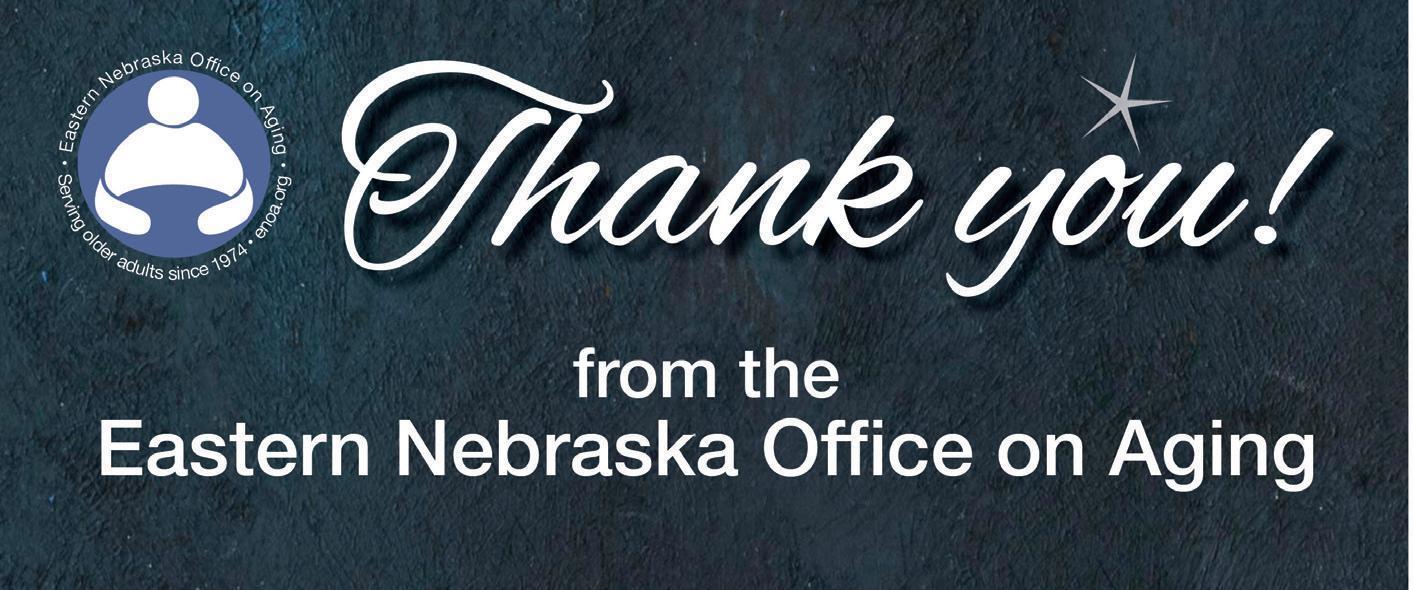
--See page 16.
God was her family. She adored her grandchildren. I can only hope to live up to the woman my mother was.”
Shy Kathy only sang publicly at the insistence of Shirley and Morning Star’s then-minister of music, Glenn Burleigh, who recognized her talent and gave her solos. Similarly, she only tried out for “Tech High’s school musical,” “The Wiz,” after drama teacher Jim Eisnehardt heard her voice in show choir and pressed her into auditioning. She won the role of Dorothy and caught the acting bug in the process.
She appreciated what Eisenhardt gave her.
“He made it very clear that as a theater-maker you have to be committed, dedicated, all-in. He supported me throughout my career, all the way up to his passing last year.”
Once Kathy found a home in
By Ron Petersen
Alocal veteran who is hearing-impaired due to his military services, had trouble knowing when people would come to his front door because he couldn’t hear the doorbell or knock on the door.
He was nominated, and then gift-
theater, mom followed.
“When I started performing in the community it drew my mother out to do shows at the Center Stage Theatre, the Playhouse and with Gordon Cantiello’s Cabaret Productions. It really ignited some things for her. We even did a couple music revues, cabaret-style shows together. It was amazing and awesome to be able to share the stage with her.
“My mother implemented a rule that when we were in the theater space we acted as ensemble members and not mother-daughter. What that prevented was personal feelings becoming involved. One time a director snapped at her really badly and I got really upset. That’s when my mom put that rule in place.”
The pair also did the musical Ain’t Misbehavin’ together for the Center Stage. An earlier Center Stage production of it was the first show Kathy did after high school. It proved memorable because the show became Nebraska’s entry in a world amateur theater competition. As it kept winning, cast and crew traveled to compete regionally, nationally and internationally. That took resources they didn’t have.
“The philanthropic community donated. We did fundraising performances everywhere. A TV crew followed us. Omaha really got behind us,” Tyree said.
It all culminated with the Omaha troupe winning the finals in Japan and being welcomed by a cheering crowd at Eppley Airfield upon their triumphant return.
“We got so much love and support. I was so young and had never been anywhere. Theater just completely changed my life.”
--Tyree continued on page 9.
ed a Ring Video Doorbell, which was a gift given from the Hillcrest Foundation for Enhancing Lives.
“The gifts we provide might change the quality of someone’s life,” Hillcrest Foundation for Enhancing Lives executive director, Sandy Lemke said.

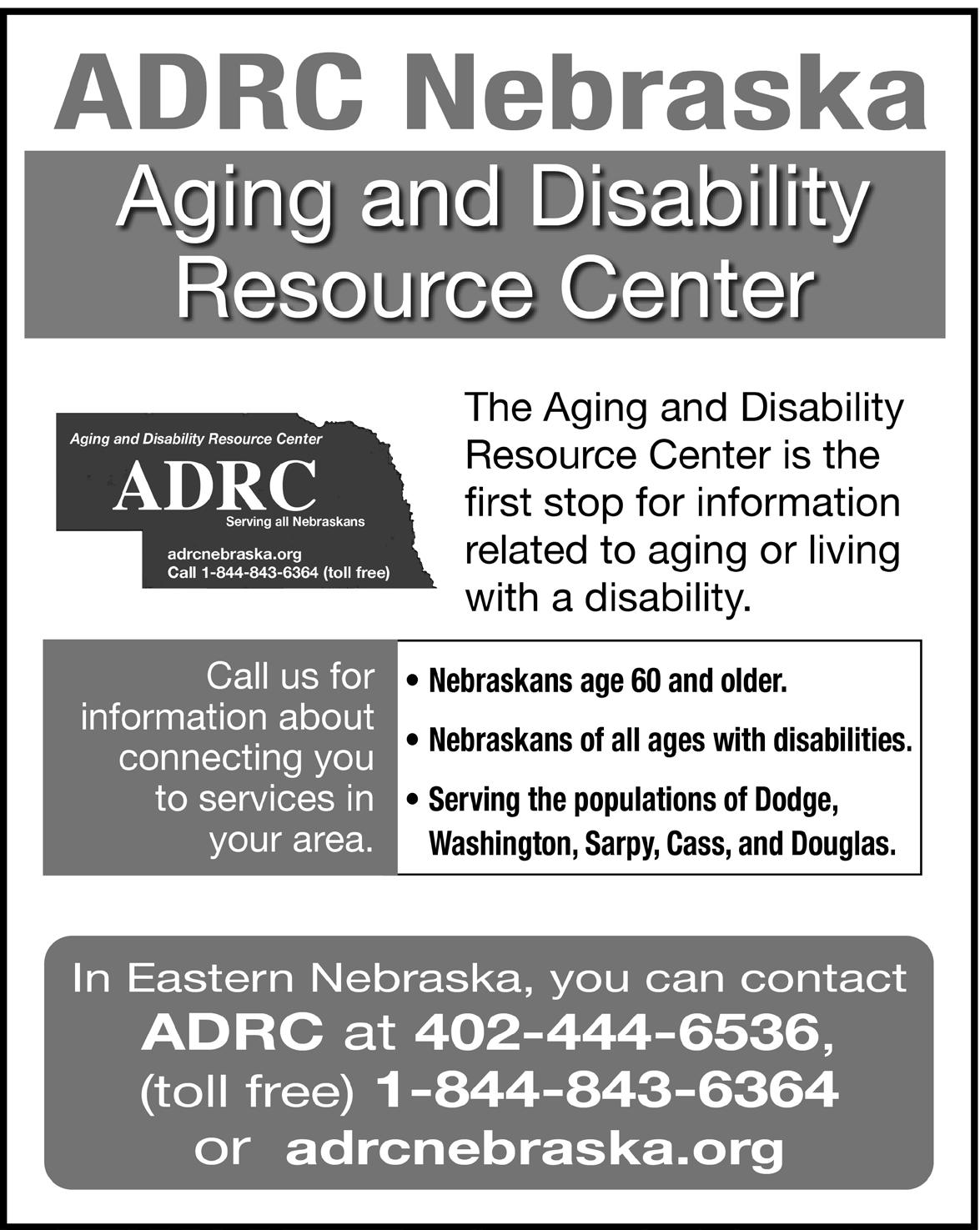

By William E. Seidler, Jr. SEIDLER & SEIDLER, P.C. Attorneys-at-Law
If you have your belongings stored in a self-storage facility, or are thinking about renting a self-storage unit, you should be aware of your rights and obligations in your stored goods.
There has been a proliferation of ministorage and self-storage facilities in the past ten years. There are rental units ranging from outdoor spaces for cars, trailers, and mobile homes, to indoor climate control units for smaller items.
Dimensions for indoor spaces range from 5’ x 5’ to 10’ x 30’. Industry statistics
insurance policy. Some rental agreements may require you to give the operator a certificate of insurance showing that you have insured your stored property.
The rental agreement and the facility rules limit the days and hours that you may have access to the premises.
The rental agreement will prohibit you from living in the unit, or storing hazardous materials, such as gasoline, or solvents.
Nebraska law provides that the operator has a lien on all of your property stored at the premises. This is important if you do not pay the rental charge on time.
Nebraska law provides that you must allow the operator to enter your space for inspection or repairs.

your property was being sold without your knowledge, it would not be entertaining to you.
Nebraska’s Self-Service Storage Facilities Act regulates some aspects of self-storage facilities. It is an operator friendly law. The law does not favor you as an occupant.
Self-storage unit operators require you to sign a rental agreement. The rental agreement is between you and the facility. You should make sure you understand all of the terms of the rental agreement.
The rental agreement will have a description of the unit you are renting, the term of the rental, and the rental amount. After the expiration of the initial term, the operator has the right to increase the rental amount. The rental agreement requires a security deposit.
Nebraska law provides that, even though you have your goods stored at a facility, you have the exclusive care, custody, and control of all of your property stored in the space.
This means that you need to insure your own property. The operator does not insure your goods. You may be able to add coverage under your homeowners policy, or, you may have to purchase a separate renters
If there is an emergency, the operator may enter your space for inspection or repair without notice to you, or without your
The rental agreement must contain a statement, in bold type, that if you do not pay the rent, the operator may deny you access to your unit, and notifying you of the existence of the lien, and that if you do not pay the rent on time, your stored personal property may be sold to satisfy the lien.
If the rental agreement specifies a limit on the value of personal property that you may store in the space, then that limit is the maximum value of the personal property in your leased space.
If you are in default for more than fortyfive days, such as by not paying the rent, the operator may enforce the lien by selling your stored personal property for cash. The operator must give you notice, at least forty-five days before the sale, by sending notice of default to you by verified mail or electronic mail.
If you have property stored at a selfstorage unit, you should tell anyone that helps you with your finances, that way, if anything happens to you, arrangements can be made for continuing to pay the rent, or removing the stored property.
Self-storage units can provide flexibility in storing property, but if the rent is not paid, a family might lose important possessions.
The information contained in this article is general information. Slight changes in individual situations may require material variance in the applicable advice. You should not attempt to solve individual problems based on the advice in this article.
By Tony Harris AARP NE Information Center
In a recent AARP Nebraska survey, 93% of Nebraskans age 45-plus said staying mentally sharp as they age was very important to them.

The truth is, as we live longer, it is increasingly important that we think about the things we can do to promote
and sustain brain health.
On February 19 at 1:30 p.m., everyone is invited to attend the AARP Nebraska Information Center’s monthly program to hear Janelle Beadle, Professor of Gerontology at the University of Nebraska Omaha, who will discuss brain health, talk about the latest research on the brain and aging, and tell us the things that we can do to promote brain health as we age.
The Information Center is
open on Tuesdays, Wednesdays and Thursdays from 10 a.m. until 4 p.m.
If you are interested in becoming more involved, stop by the Information Center to learn more about the many opportunities to get involved in the community by becoming an AARP Nebraska volunteer.
For more information call the Information Center at 402-916-9309.
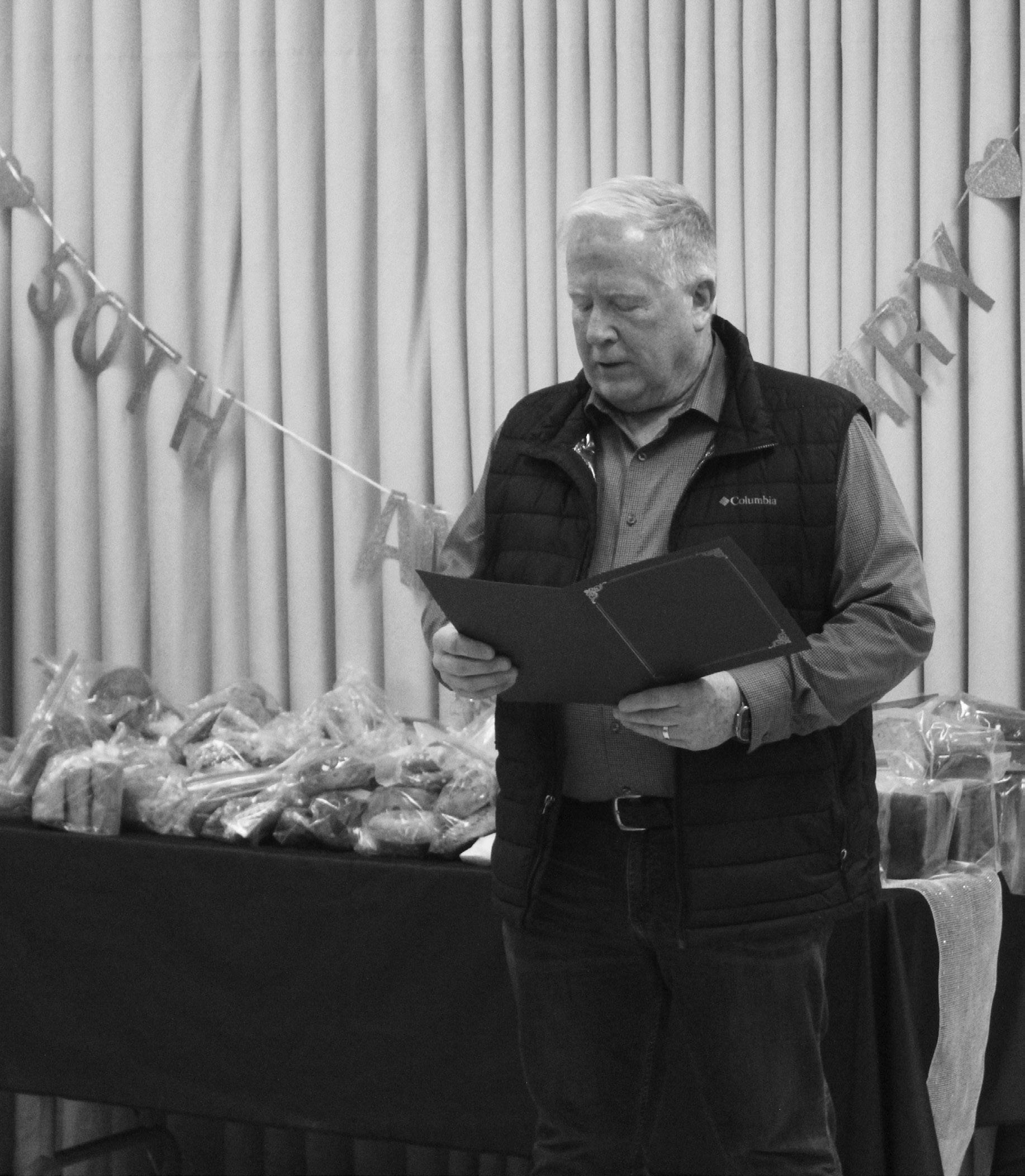
HORIZONS
In January, Bellevue Mayor Rusty Hike, read a copy of the Bellevue Senior Center Proclamation during the center’s 50th Anniversary celebration.
Participants attended breakfast with the Pancake Man, lunch, and a cake and punch reception in the afternoon. Along with the celebration activities, the center offered chair volleyball, Friday book blub, and afternoon BINGO. The Bellevue Senior Center Board members attending the event included Jim Janicki, Lisa Summers, Mary Jo Hopfensperger, and Ralph Gladbach.
Stroke is a medical emergency that requires rapid intervention, and recognizing its symptoms early can make a life-saving difference. The BEFAST acronym is a simple, effective tool used to identify the signs of a stroke and act quickly:
• Balance: Sudden loss of balance or coordination
• Eyes: Blurry or double vision
• Face: One side of the face drooping
• Arms: Weakness or numbness in one arm
• Speech: Slurred or difficulty speaking
• Time: Call 911 immediately if any of these symptoms appear
Recognizing these symptoms and acting swiftly can dramatically improve the chances of recovery. The Nebraska Stroke Association (NSA) is committed to promoting awareness of these warning signs and ensuring that residents across the state have access to the resources they need for stroke prevention, recognition, and recovery.
The NSA works to reduce the burden of stroke in Nebraska through education,
advocacy, and support. One of the primary goals of the association is to serve rural communities, where healthcare access can be limited. By focusing on these underserved areas, the NSA helps ensure that every Nebraskan knows the critical importance of stroke awareness and timely medical intervention.
The Nebraska Stroke Association provides a wealth of resources through its website, including a statewide resource map that offers up-to-date information on stroke care, prevention, and support services. This library is an invaluable tool for patients, families, and healthcare professionals, offering guidance on how to navigate the challenges of stroke recovery, particularly for those in rural or remote areas.
To learn more about stroke care and access vital resources, visit the Nebraska Stroke Association website, which empowers Nebraskans with the knowledge and tools needed to prevent, recognize, and manage strokes.

New Horizons is the official publication of the Eastern Nebraska Office on Aging. The paper is distributed free to people over age 60 in Douglas, Sarpy, Dodge, Washington, and Cass counties. Those living outside the five-county region may subscribe for $5 annually. Address all correspondence to: Ron Petersen, Editor, 4780 S. 131st Street, Omaha, NE 68137-1822. Phone 402-444-6654. FAX 402-444-3076.
E-mail: ron.petersen@enoa.org
Advertisements appearing in New Horizons do not imply endorsement of the advertiser by the Eastern Nebraska Office on Aging. However, complaints about advertisers will be reviewed and, if warranted, their advertising discontinued. Display and insert advertising rates available on request. Open rates are commissionable, with discounts for extended runs. Circulation is 9,000 through direct mail .
Editor................................Ron Petersen, 402-444-6654
402-444-4148
Contributing Writers.........Leo Biga & Andy Bradley
ENOA Board of Governors: Mary Ann Borgeson, Douglas County, chairperson; Don Kelly, Sarpy County, vice-chairperson; Lisa Kramer, Washington County, secretary; Pat Tawney, Dodge County, & John Winkler, Cass County.
The New Horizons and the Eastern Nebraska Office on Aging provide services without regard to race, color, religion, sex, national origin, marital status, disability, or age.
You probably have heard that Medical claims sometimes get denied by insurance companies. Sometimes, the insurance company denies the claim simply because Medicare or the policy does not cover that service.
Sometimes, there are coding errors. Coding errors and incomplete information account for 5-15% of all claim denials. Sometimes, claims may get denied that maybe shouldn’t have been denied.
Here are some ways to make sure that you’re getting the appropriate care. Please note that appeals typically have strict deadlines, so it’s important to act promptly.
UNDERSTAND THE DENIAL AND CORRECT ANY POTENTIAL ERRORS
Read the Explanation of Benefits (EOB) or denial notice from your insurance company and make sure that it explains why the claim was denied. If not, call the insurance company for an explanation.
Look at your insurance policy to understand coverage terms and see if the de-
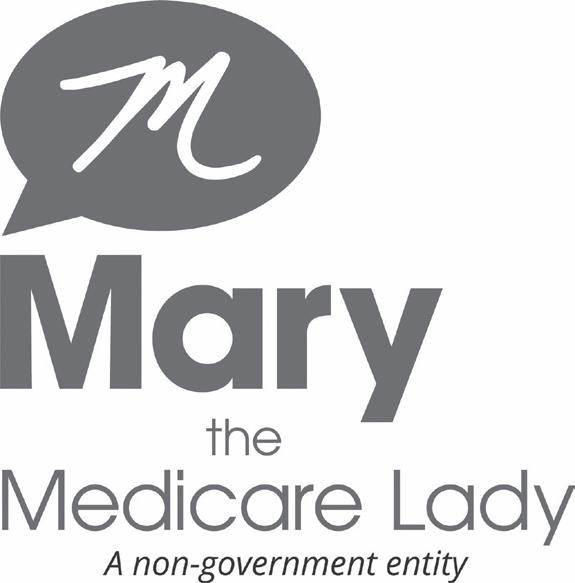
nial aligns with your plan’s rules.
Sometimes denials are due to errors or missing information that can be resolved quickly. Ask your healthcare provider to ensure that they submitted the correct procedure and diagnostic codes, as well as any additional medical records, physician’s notes, or referrals if requested.
One of the reasons to use a local independent insurance agent is that you have someone that knows you and is the same person available to you all year round that you can count on to be your advocate. However, if you don’t have a trusted local agent,




you can receive free guidance from organizations like the State Health Insurance Assistant Program, the Medicare Rights Center, the Center for Medicare Advocacy, or the Patient Advocate Foundation (PAF.)
You can also call 1-800-Medicare and request to speak to the Medicare Beneficiary Ombudsman.
FILE AN
There are 5 levels of appeal in Medicare health plans, not to be confused with Dante’s 9 Circles of Hell. After Level 2, you might want to hop on over to the section of this article on Constituent Services.
Level 1 Appeal is you will call the insurance company and tell them that you want to file an Appeal.
Follow your insurer’s appeal process. This usually involves filling out forms and providing supporting documents.
If your plan upholds their denial in your level 1 appeal, they’ll automatically forward their reconsideration decision to an Independent Review Entity (IRE) to start a level 2 appeal.
If you disagree with the IRE’s decision in level 2. You have 60 days from the date of the IRE’s decision to ask for a level 3 appeal, which is a decision by the Office of Medicare Hearings and Appeals (OMHA).
Visit Medicare.gov and search for “appeal” for full details on all the levels.
Constituent services, often provided by elected officials like members of Congress, can be a valuable resource when facing a denied claim. Most offices have a specific email address or phone line for constituent services. These offices can leverage authority to advocate for their constituents. No insurer wants to be the example of why a new law had to be introduced.
insurance (governed by the Department of Labor), Medicare, Medicare Advantage, Medicare Part D (Drug Plan), TRICARE, and VA health programs.
To find your State Legislators, visit your state legislator’s website or www. usa.gov/elected-officials to find your State Representative and State Senator. State legislators often assist with: Medicaid, ACA Individual Marketplace plans, (co-regulated by state and federal governments,) Dental, Vision, and other Ancillary benefits.
Legislators’ constituent services teams act as intermediaries between you and the organizations or government entities causing the issue. They have established contacts and processes to escalate cases, and while they cannot guarantee an outcome, elected officials’ inquiries can sometimes prompt faster reviews or reevaluations of claims, ensuring you receive appropriate benefits.
For Federal Programs, Legislators can press insurers and plan sponsors by working through federal agencies such as the Department of Labor or CMS (Centers for Medicare & Medicaid Services.)
For State or Joint Programs, State legislators can coordinate with state Medicaid offices or insurance commissioners.
Tips for Working with Constituent Services: Be prepared to share detailed information and documentation about your claim, denial, and any correspondence with the insurer or provider. You will likely need to sign a privacy release form allowing the representative’s office to act on your behalf.
Follow up and keep in regular contact with the representative’s office to track progress and provide updates. Be patient but persistent.
Utilize both State and Federal offices: Depending on the program, one office may be more effective than the other.


Contact Your Representative: To identify your Federal Legislators, visit www. congress.gov to find your U.S. Representative and U.S Senators by entering your address. These representatives handle issues involving programs like: Employer-sponsored health
If you are dealing with a denied claim or poor service from a Medicare Advantage company, you can file a grievance. This is different than an appeal asking them to review the denial.
Call your plan’s Member Services department (the number is on your Medicare Advantage card or plan materials). Inform them of the issue and ask them to file a formal grievance. You can typically do this by phone, in writing, or online, depending on the plan.
Prepare supporting information including your name, Medicare number, and contact information. Give a clear description of the issue, including dates, times, and names of people you interacted with; Copies of related documents (e.g., bills, correspondence, EOBs). And make sure to meet the deadline. Medicare requires grievances to be filed within 60 days of the event causing the complaint. Some plans may allow more time.
Ask the plan to confirm receipt of your complaint and provide a written resolution. Plans are required to respond within 30 days, or within 24 hours for urgent cases.
By following these steps and utilizing available resources like Constituent Services and Medicare advocacy programs, you can address a denied claim or grievance with your Insurance company and ensure that your concerns are resolved. Stay organized, act promptly, and seek assistance when needed to improve your chances of success.
Including constituent services in your efforts to resolve a denied claim can add a layer of advocacy and visibility that may help expedite resolution. If your issue is resolved, let your legislator’s office know and share your story to help others know about their services.
Mary Hiatt is a Retirement & Insurance Advisor and President of Mary the Medicare Lady (A non-government entity.) She offers Educational Workshops on Medicare, Drug Savings, and more at no charge. Not connected with or endorsed by the U.S. government or the federal Medicare program. Medicare Supplement insurance plans are not connected with or endorsed by the U.S. government or the federal Medicare program. See www.hiattagency. com or contact licensed independent agent mary@ hiattagency.com or call or text 402 672 9449 for more information.
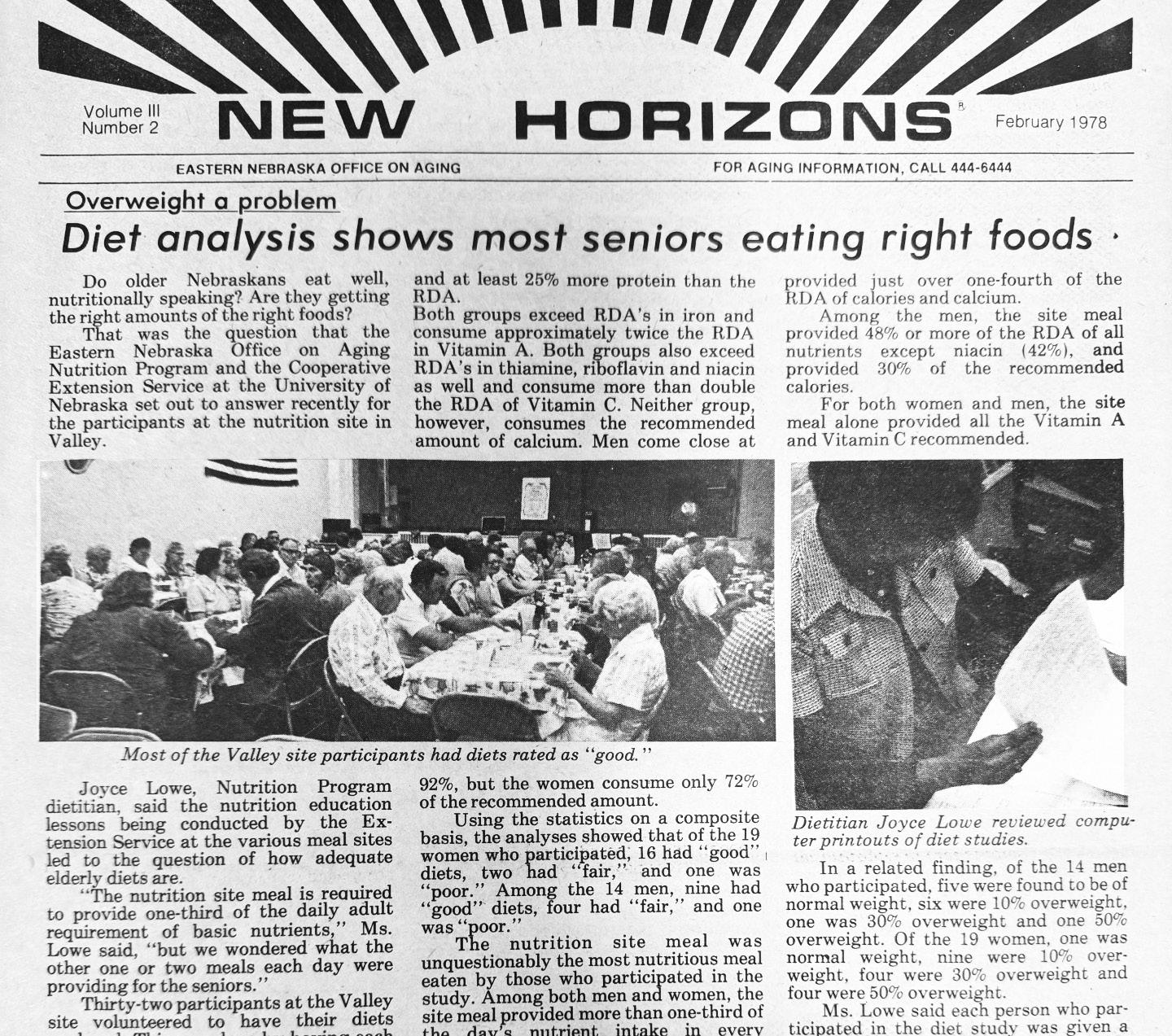
In February of 1978 issue of the New Horizons, an article was published about the analysis done by Joyce Lowe, from the Nutrition Program.
The Eclectic Book Review Club, founded in 1949, is announcing its Spring 2025 schedule of author appearances. Each event includes readings and discussion by the noted book’s author. New members are being accepted. The monthly meetings, which include lunch and the author book review, are held at noon at The Field Club of Omaha, 3615 Woolworth.
To reserve a seat, call Jo Ann at (402) 571-5223.
Reservation deadline is the Friday morning prior to the Tuesday meeting.
Authors for spring 2025 include:
• February 18- Stu Burns, editor of Willa Cather *Early Stories*, will discuss some of Willa Cather’s rarely-seen stories from her first years as a writer. This collection includes thirty of Cather’s earliest published pieces.
• March 18- To be announced.
• April 15- Carolina Hotchandani is an author, poet, and the Goodrich Assistant Professor of English at the University of Nebraska-Omaha. She will share her poetry book The Book Eaters. This debut book has been recognized with the Nebraska Book Award for Poetry.
• May 20- Timothy Schaffert, a professor of creative writing and the author of numerous books will present his most recent title, The Titanic Survivors Book Club. This tale focuses on the life-changing power of books, following the Titanic librarian whose survival upends the course of his life.
The University of Nebraska Medical Center is looking to understand the nutrition and the health of the community. Participation in the survey may provide valuable insights that may guide efforts to enhance the quality of life for everyone, especially older adults in Nebraska. Risks include breach of confidentiality and privacy and stress-induced questions.
Do you qualify? They are looking for adults 65 years of age and older, adults who live independently, speak English and they must live in Nebraska.
If you are interested, please call 402-836-9283 or email Emily Frankel at efrankel@unomaha.edu.
ou’re invited to visit the La Vista Senior Center, located at 8116 Park View Blvd. The facility provides activity programs and meals Monday through Friday from 8 a.m. to 5 p.m. Please call 402-331-3455 for general Community Center hours.
Meals are served weekdays at 11:30 a.m. Reservations are due by noon the business day prior to the date the participant wishes to attend and can be made by calling 402-331-3455.
A $5 contribution is suggested for the meal if you are age 60 and older. If you are under age 60, then the meal cost is $9.50.
In addition to meals being served daily, the La Vista Senior Center offers a variety of activities such as: Bingo, outings, cooking classes, movies with popcorn, arts and crafts, a variety of card games, quilting, tai chi, exercise classes, musical entertainment and various parties. Please visit our website at cityoflavista.org/seniors for updated information or call 402-331-3455.

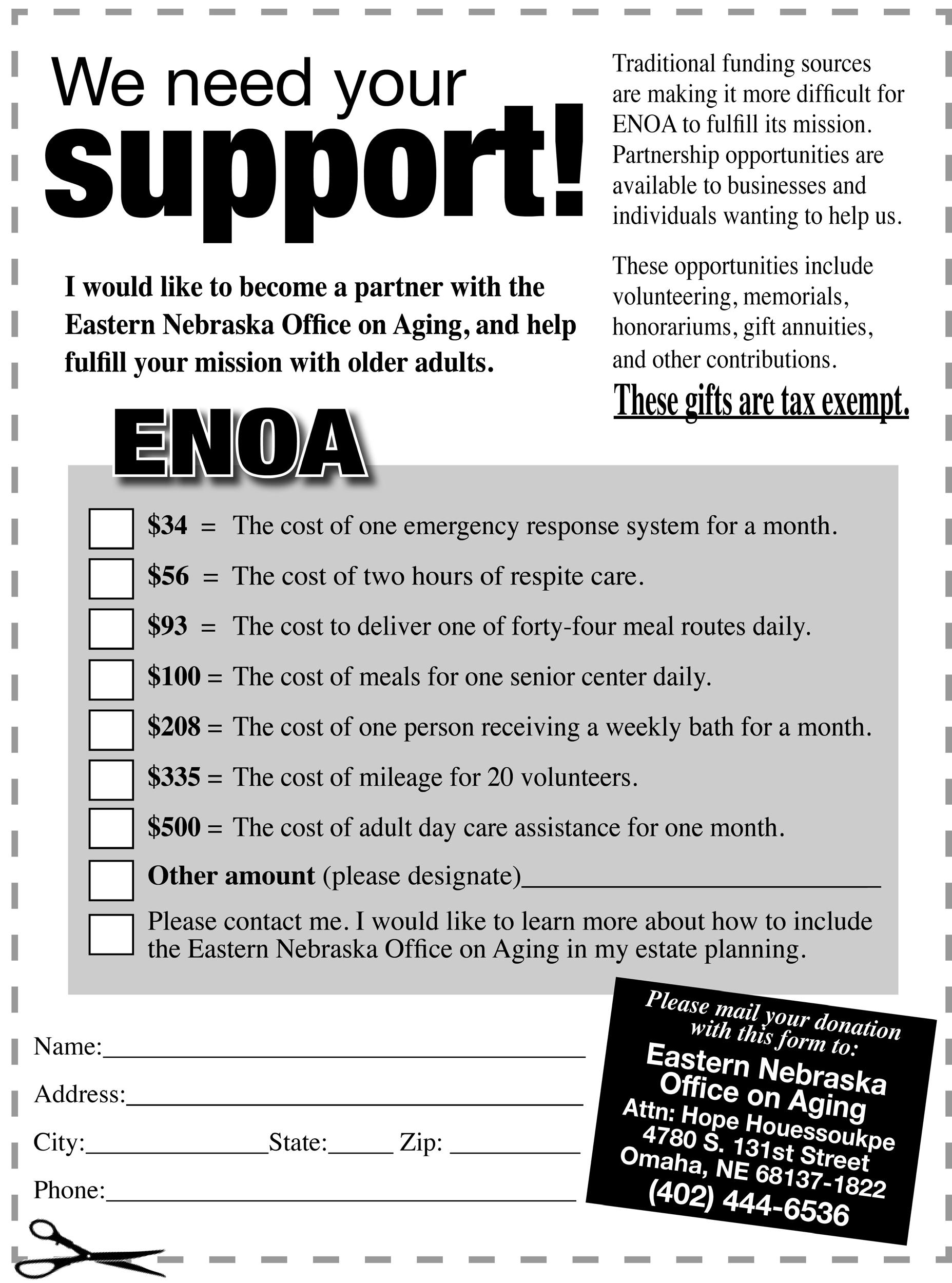
Please see the ad on page 3
$50
Bonnie White
Donna Chaney
$25
Jim Huber
$10
Sarah Gaxiola
Wayne LaCosse
$5
Kathleen Koons
Julie Binderup
Cathy Hynes
Millard Senior Center
You’re invited to visit the Millard Senior Center at Montclair, 2304 S. 135th Ave., this month for the following:
• February 5: Board meeting @ 9:30 a.m.
• February 10: Bunco @ 12:15 p.m.
• February 12: P.A.W.S Group @ 9:30 a.m.
• February 12: Board meeting @ 9:30 a.m.
• February 12: Sewing club @ 9:30 a.m.
• February 14: Valentine Pizza Party @ 11:30 a.m.
• February 17: Closed for Presidents’ Day
• February 24: Soup and Chili Day @ 11 a.m.
• February 24: Book Club “Dear Edward” by Ann Napolitano @ 1 p.m.
Tai Chi on Mondays and Fridays @ 9:30 a.m. Bingo every Tuesday and Friday @ 12 p.m. Sportswear Fridays. Wear your favorite team attire every Friday.
Hand-N-Foot Wednesdays @ 8:30 a.m. MahJongg Wednesdays @ 1 p.m. Chair Volleyball Thursdays @ 9:30 a.m. Dominoes Thursdays @ 12:30 p.m. For more information, please call 402-546-1270.
You’re invited to visit the Florence Senior Center, 2920 Bondesson St.
At the Florence Senior Center, lunch is served at 11:30 am. A select menu is offered Monday thru Friday. Meal reservations must be made one day in advance. Please call by noon the day before for a meal reservation.
The center hosts activites such as Tai Chi, annual picnics/ special events, bingo, cards, gym & game room access, special guest speakers and socials.
Arts and crafts will be held on the third Wednesday of each month. They also provide health and nutrition programs.
For more information, please call Colleen Metz @ 402444-6333.
Yoga in the Forest: Discover tranquility amidst the trees during Yoga at the Forest on select Sundays. Each Vinyasastyle yoga class will incorporate a blend of mindful movement and breath work, all guided by experienced instructors.
Winter Wellness: Reiki Meditation- Visit the Nature Center, experiencing soothing frequencies of a Reiki infused guided meditation. Facilitated by Reiki Master Heather Pearson of Flowing Feather Reiki, this meditation will help you align with nature’s healing frequencies.
For more information, call Bridget Hanson with Fontenelle Forest at 402-731-3140.
By Judy Ford, from Archwell Health
Wellness doesn’t just happen. It’s the result of steps you take all year long. To help you start, we’ve put together a calendar of things you can do each month to focus on wellness in 2025.
JANUARY
Lots of people join gyms during January. But you don’t have to hit the gym to be physically active. Before you start a new fitness regimen, be sure to talk with your doctor.
What to do:
• Schedule regular wellness visits.
• Caregivers: Remember to schedule your own wellness visits too.
February is American Heart Month and the time for Valentine’s Day. Show your love by learning the symptoms of heart attack and stroke, as well as CPR. It can double or triple the odds of survival.
What to do:
• Get your blood pressure checked.
• Caregivers: Earn bonus points by learning CPR.
This month is National Nutrition Month, but eating right should be a year-round commitment. As we age, our bodies need fewer calories but more nutrients like calcium, vitamin D and protein.
What to do:
• Talk to your doctor about which foods are right for you.
• Caregivers: Help your loved ones by incorporating nutrient-rich foods into their meals.
April is Occupational Therapy Month, a perfect time to learn how occupational therapists contribute to wellness. These health professionals can help you manage daily tasks and learn to prevent falls, which is crucial since a quarter of older adults experience falls every year.
What to do:
• Talk with your doctor about daily tasks you’re having trouble with.
• Caregivers: Your in-home observations can be especially helpful here.
May is Mental Health Awareness Month. If you’re feeling anxious, depressed or just a little blue, now’s the time to take action.
What to do:
• Caregivers: Mental health is important to you, too. Talk with a counselor if you’re feeling overwhelmed by your caregiving responsibilities.
Make your home safer this month is in honor of National Safety Month. This is a great time to check your home for problems like loose rugs and missing light bulbs. The National Council on Aging offers free guidance online, including a room-by-room checklist, to help you identify and fix potential hazards.
What to do:
• Take proactive steps to ensure your home is safe.
• Caregivers: Help your loved one address any safety concerns at home.
This month we mark UV Safety Awareness Month. It’s a reminder that sun exposure is the leading cause of skin cancer, most often diagnosed in adults over 65. Protect yourself by using sunscreen, wearing a hat and long sleeves and avoiding sun exposure between 10 a.m. and 4 p.m. (daylight saving time).
What to do:
• Schedule a skin cancer screening if you have a higher-than-normal risk.
August is National Immunization Awareness Month, so it may be time to roll up your sleeves. Nobody likes getting shots, but vaccines can prevent suffering and even death. The shingles vaccine, for example, is more than 90% effective at preventing shingles, and you can get the vaccine even if you’ve had shingles before.
What to do:
• Review your vaccination list and talk with your doctor about those you’ve missed.
This month marks Healthy Aging Month, a reminder that aging and health can go hand in hand.
What to do:
• Talk with your doctor about any barriers that are holding you back from enjoying life to the fullest.
• Caregivers: Support your loved ones by discussing their health concerns and encouraging them to seek the help they need.
October is Breast Cancer Awareness Month, so you’ll see lots of pink ribbons. These ribbons remind us that breast cancer affects more women than any other cancer except skin cancer. Mammograms are the best way to detect breast cancer early when it’s easiest to treat.
What to do:
• Schedule a mammogram as needed, and talk with your female loved ones about getting one, too.
November is Lung Cancer Awareness Month, shining a light on the third most common cancer in the U.S. If you’ve ever smoked, ask your doctor whether you should get screened. Early detection can increase your survival odds by 63%.
What to do:
• Talk to your doctor about lung cancer screening.
This month is chock-full of winter holidays and year-end celebrations. After a year of working on wellness, take a break to celebrate. What to do:
• Enjoy your time with family and friends. Just savor your holiday treats in moderation!
• Caregivers: Ensure your loved ones enjoy the festivities safely by helping them maintain a balanced routine and monitoring their well-being.
You’re invited to visit the Fremont Friendship Center, 1730 W. 16th St. (Christensen Field). The facility is open Monday through Thursday from 9 a.m. to 3 p.m. and Friday from 9 a.m. to 12:30 p.m.
A meal is served weekdays @ 11:30 a.m. Reservations, which are due by noon the business day prior to the meal the participant wishes to enjoy, can be made by calling 402727-2815. A $4.25 contribution is suggested for the meal.
This month’s activities will include:
• February 5: Music with Joyce Torchia provided by Merry Maker’s @ 10:30 a.m.
• February 6: Presentation from Nye @ 10 a.m.
• February 12: Music with the Links @ 10 a.m.
• February 13: Mobile Library @ 9:30 a.m.
• February 17: Center closed for President’s Day
• February 19: Music with John Worsham @ 10:30 a.m.
• February 20: Nutrition Minute @ 10:15 a.m.
• February 25: Board Meeting @ 1:30 p.m.
• February 26: Music with Bill Chrastil@ 10 a.m. Craft class on Tuesday afternoons @ 1:30 p.m.
Tai Chi offered every Tuesday and Friday from 9:15-10 a.m.
If you can’t stay for lunch with our friends and you currently participate in any activity at the center, you may now order a Grab-n-Go meal to take home for your lunch. Grabn-Go meals must be reserved the day before by noon and the person ordering the lunch must come in to the center to pick it up at 11 a.m. The number of Grab-n-Go lunches are limited to a first come first serve basis. Suggested donation is $4.25.
For meal reservations and more information, please call Laurie at 402-727-2815.
You’re invited to visit the Camelot Friendship Center, 9270 Cady Ave., for regular activities, which include Chair Yoga, card games, Tai Chi, Pinochle, 10 Point Pitch, and bingo. This month’s events include:
• February 12: Presentation about Diner’s Choice with Christina from ENOA @ 11:45 a.m.
• February 12: Craft Day@ 12:30 a.m.
• February 13: Presentation with Kelsi from Omaha Performing Arts @ 11:45 a.m.
• February 14: Valentine Day Party. John Worsham performing @ 11:15 a.m.
• February 17: Closed for President’s Day
• February 18: Presentation with Mary Parker from ENOA @ 11:45 a.m.
• February 19: Presentation about Applying for Homestead Exemption @ 11:45 a.m.
• February 20: “Jackpot Bingo” @ 12:15 p.m.
• February 21: Book Club meets @ 12:30 p.m.
Every Monday – Card Game: Manipulation @ 10 a.m. Every Monday – Pickleball @ 10 a.m.
Every Tuesday, Wednesday and Thursday – Kings in the Corner @ 12:30 p.m.
Every Wednesday – Hand & Foot @ 12:30 p.m. Every Wednesday – Chair Volleyball @ 10 a.m. Grab N Go meals are available.
For more information, contact Barb at 402-444-3091 or barbara.white@cityofomaha.org.
You’re invited to visit the Ralston Senior Center, 7301 Q St., Suite 100 this month for the following:
• February 5, 9 & 26: Bingo @ 12:15 p.m.
• February 12: Board meeting @ 9:30 a.m.
• February 13 & 27: Bingo @ 1 p.m.
Lunch is catered in on Wednesdays @ 11:30 a.m. A $5.50 contribution is normally suggested for the meal. Reservations are due by noon on Tuesday. Games and bingo will be played after lunch. Contact Darla @ 402-331-1529 for reservations. Obtain an annual Ralston Senior Center membership for $10.
On days the Ralston Public Schools are closed due to the weather, the Ralston Senior Center will also be closed. Contact Ron Wilson @ 402-734-3421 for further information.



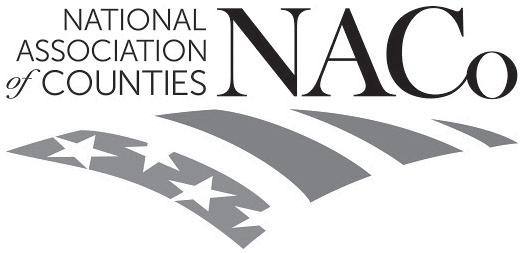
•
By Ron Petersen
Get up on your feet and get ready to groove at the Omaha Jitterbugs in downtown Omaha.
The Omaha Jitterbugs, a nonprofit arts organization, hosts a social dance and lesson from 7:30 p.m. to midnight every Friday at the Eagles Ballroom, located at 201 S 24th.
Omaha Jitterbugs Board President and teaching artist Merinda Collins, has been with the Jitterbugs since it first opened its doors 25 years ago. Collins said the Jitterbugs have grown into a well-known dance community ever since.
“We started off holding dances once a month, but once we held dances every week, we saw the growth with about 100-150 people passing through the doors,” Merinda Collins said. “We are a welcoming community, and everyone loves to dance.”
Every month, the Jitterbugs host new and old classes to the public for anyone looking to give swing dancing a try. Along with classes and workshops, there is addition events dur-
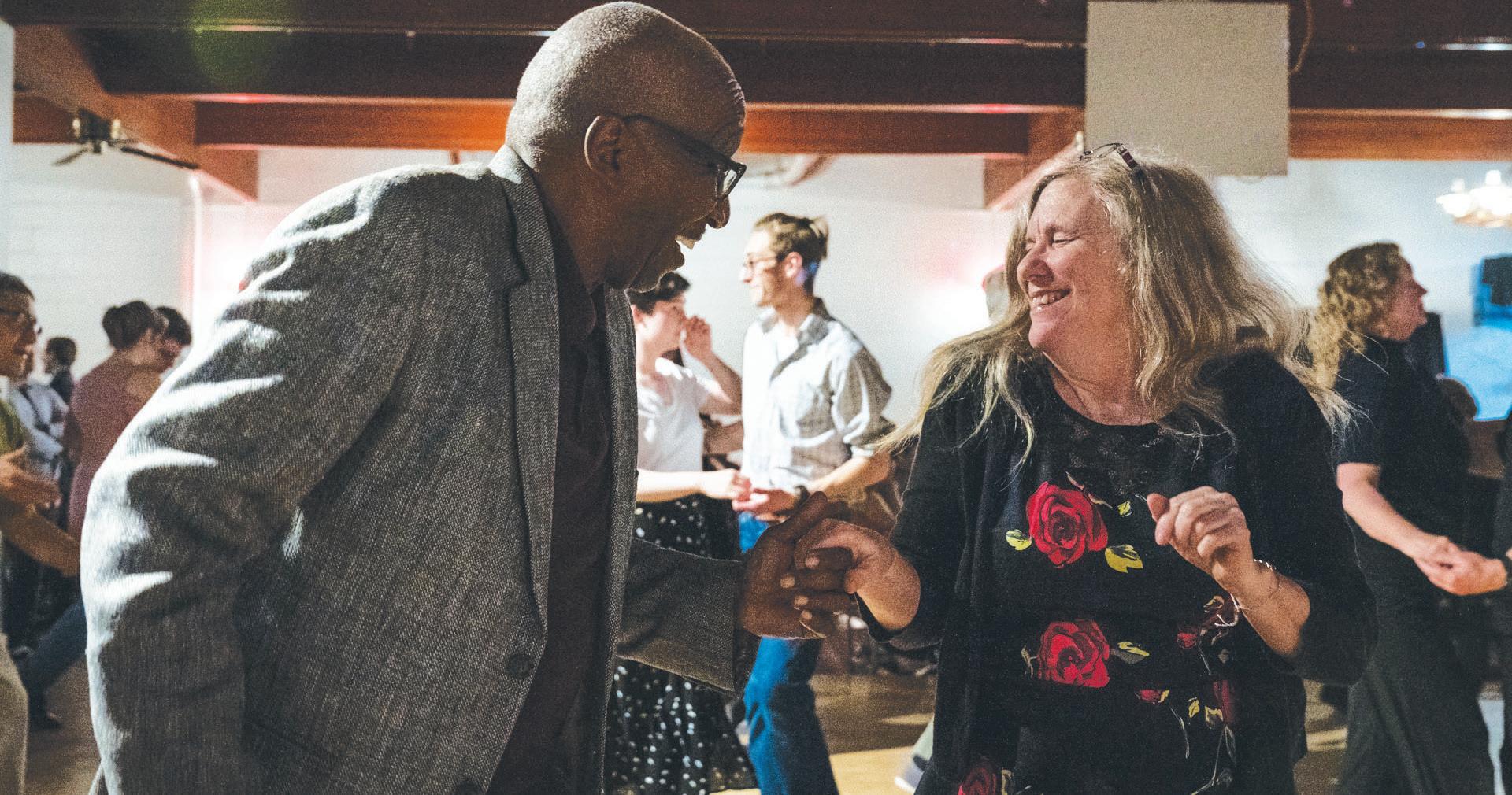
ing the summertime held at Gene Leahy Mall, as well as the Crowntown Jamborama, which is an annual Omaha jazz and swing dance festival held in September.
But the main attraction for the Jitterbugs is held every Friday evening at the Eagles Ballroom.
Doors open at 7:30 p.m. and the lesson begins at 8:15
p.m. Open dance begins at 9 p.m. and will go on until midnight.
“We always have a big lesson in the beginning — we will have about 80 people there to learn from the dance ambassadors,” Collins said. “The ambassadors are there to help and dance with any people that have questions. We have
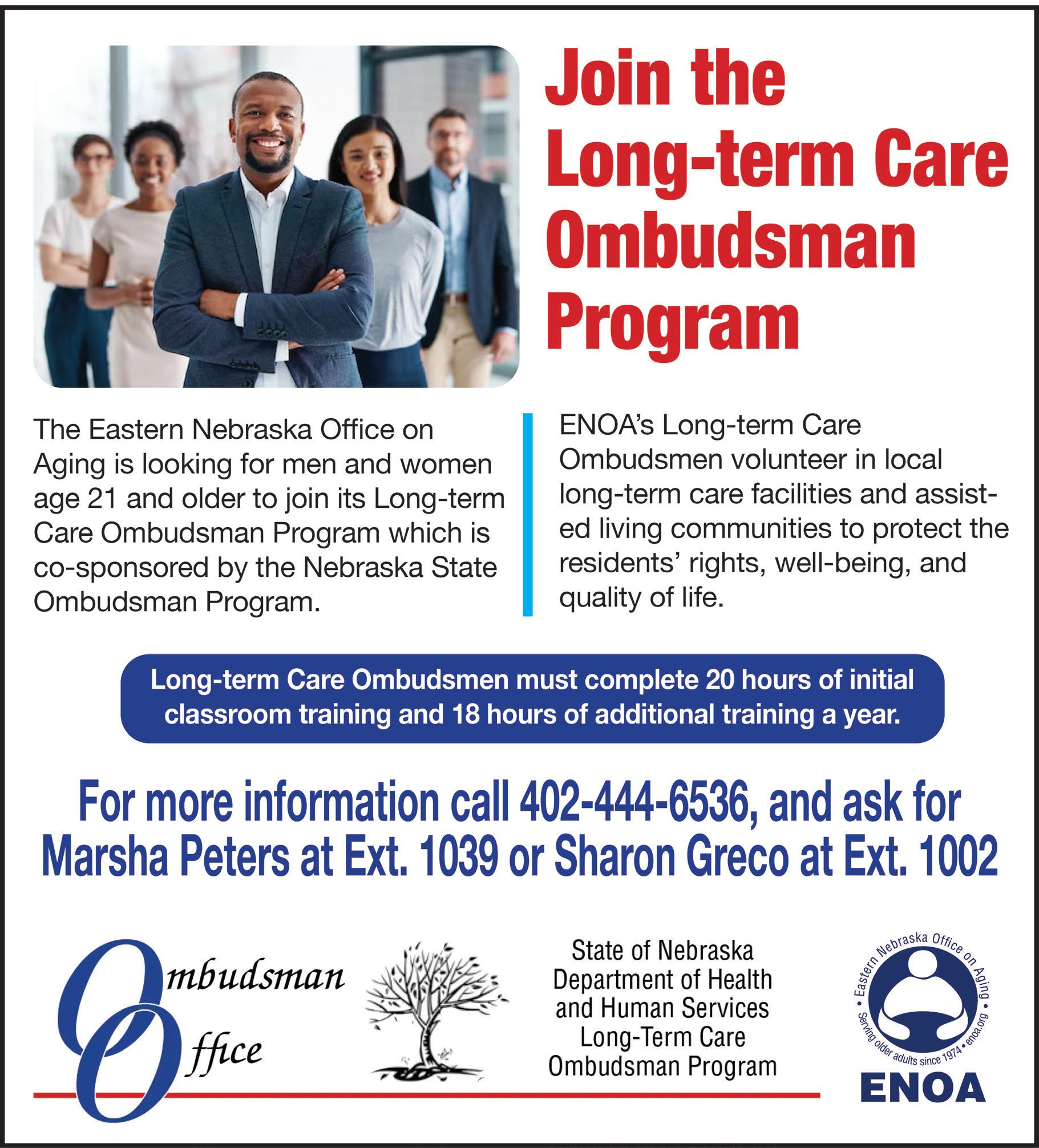
two there in the beginning, one in the middle of the lesson, and then one ambassador that will go around to help people learn to dance throughout the evening.”
General admission on Friday nights is $10 and $5 for members.
While there is room for plenty of new faces, the Jitterbugs has provided a
social community for those who attend regularly.
“The Jitterbugs are super welcoming. You are welcome to come and watch, and socialize,” Collins said. “It’s great to see people there that are interested in music and are looking to dance.”
For more information, visit jitterbugs.org.
The CAPACITY Lab in the Department of Gerontology at UNO is looking to talk to older adults about recruiting family caregivers for older adults with dementia.
The study will include two in-person visits of approximately three hours each that will take place at the University of Nebraska at Omaha (UNO) and the University of Nebraska Medical Center (UNMC). The study involves completing questionnaires, interviews, and tasks, a blood draw, and brain imaging. Parking is complementary and located a short walk from the building where the experiment will take place. Compensation for study participation is available.
To qualify, you must be an adult between 45–75 years of age, female, right-handed, and currently an unpaid family caregiver to an individual with Alzheimer’s disease, frontotemporal dementia, vascular dementia, or Lewy body dementia for at least 10 hours a week and for at least 6 consecutive months. You must have comprehension of written and spoken English, have normal or corrected to normal hearing and vision, have mobility to travel to UNO and UNMC and must have completed a minimum of two years of high school or higher.
If you are interested please call 402-554-2951 or email Janelle Beadle, Ph.D. at UNOCapacity@unomaha.edu.
First United Methodist Church has some excellent adult curriculums available. They are free for any Christian group which would like to study prayer, discipleship and beliefs.
Call First United Methodist Church at 402-556-6262 if you wish to receive more information about the list of the studies available.
She went on to do several Center Stage shows and counts her experiences with its creatives among her fondest memories. Her path crossed there with music director Claudette Valentine and theater makers Bill Davis, Bill Bohannon, and Mike and Linda Runice.
“It was like family. When you got cast in a show many times it got costumed out of your closet. We helped build sets. We always had a huge potluck dinner on Sundays between shows. Then everybody had their designated place to go take a nap. It was wonderful.”
She appreciates the artists she’s collaborated with over time on various Omaha stages.
“I have been blessed to work with some dynamic music directors – Jonathan Cole, Jim Boggess, Justin Payne, Ananias Montague –as well as directors like Susie Baer Collins and Denise Chapman.”
It was Chapman, along with Chicago-based actor, playwright and artistic director Carla Stillwell, who spotted and nurtured Tyree’s potential as a director.
Tyree’s forged a close working relationship with Omaha native and New York-based dancer-choreographer Ray Mercer.
“Ray is a dear heart to me. Anytime I ask him to come back to Omaha to choreograph for me he tries to make it happen. I haven’t gotten a no yet.”
Mercer choreographed her Playhouse productions of “Dreamgirls and Ain’t Misbehavin’ ” and she directed his narrative-dance production Omaha’s Forgotten Century for Omaha Performing Arts.
Though Nebraska’s still home, Tyree’s set her sights beyond here. Her regional theater breakthrough came in 2023 at TheatreSquared in Fayetteville, Ark., where she starred in Chicken & Biscuits.
She got invited back to appear in “I Am Delivered” at the Arkansas New Play Fest and to co-star in A Raisin in the Sun (as Lena Younger). “It definitely inspired me to know I can do it outside of Omaha because sometimes you wonder, Am I really good enough or do they just love me here? But then when I step outside of Omaha and get those positive responses it’s confirmation that, yeah, you go it, you can do this. It’s a
beautiful, humbling experience at the same time. I’m just grateful for it.”
She’s open to wherever new opportunities take her. “I love traveling to new places and meeting new people and working with new directors and seeing how other theater companies engage in their communities.”
Until others suggested she has what it takes to be a director, Tyree never thought about it. She’s now a director in demand. She recently directed “A Christmas Story: The Musical at The Rose” and will direct “Milo Imagines the Word” there this spring.
Directing feeds her in ways acting doesn’t. “It allows me to be the creator and the main visionary of the piece. But I’m not a director that makes all the decisions or says it has to be this way or that way. I’m very collaborative, even down to who is cast. In particular if it’s a musical that’s a decision made by myself, the music director and the choreographer. I don’t tell my costume designers what they should design, I tell them what my vision is and then support them where they go from there. It’s that way, too, with the lighting, sound and scenic designers.”
Directing, she said, “opens a completely different creative portal.” Being both an actor and director, she added, “keeps me very mindful as a director what I’m asking of my actors, who after all are human beings with a whole life outside of theater.”
She’s pretty much done it all in theater herself with the exception of playwriting and that may still be an avenue she pursues.
“I have ideas that swirl in my head but I haven’t taken a stab at writing yet.”
In addition to acting and directing gigs, Tyree produces and performs concerts through her own Kathy Tyree Productions. She originally tried launching her production company in 2006-2007 but couldn’t make a go of it. In 2014 she tried again, but not without offering it up first. This prayer warrior doesn’t embark on anything new without seeking intercession. At the time she managed the Healthy Start maternal and child program at Charles Drew Health Center and only quit to be a full-time creative after discerning

COURTESY PHOTO
Kathy Tyree has been performing for 30 plus years and has been given the title of “Omaha’s Own Queen of Soul”.
Tyree has been afforded the opportunity to work with some of the best performers, directors, choirs, choreographers and tech crews that Omaha has to offer.
through prayer it was the right move.
“I knew it would be lifechanging and at times a little scary. At that exact same time my son graduated high school and left Omaha to attend design school, so here I was putting this kid through college and quitting my job and launching a production company. But then again folks uplifted and supported me, had my back, wiped my tears, held my hand.”
She’s since done projects for the Nebraska Humane Society, 100 Black Men of Omaha and Native Omaha Days as well as a series of musical revues (The Women I Love to Sing, The Men I Love To Sing, Women in the Spirit, Back Down Memory Lane, A Night to Remember). On Feb. 8 she reunites with friend and fellow Omaha songstress Camille Metoyer Moten for Kathy and Camille, a concert with the Omaha Symphony at the Hoff Center for the Performing Arts in Council Bluffs.
Until finally making the move to be a full-time artist this single mom worked various regular jobs, including property management with Omaha Housing Authority and private realty firms, mopping floors, and overnight caregiving for dementia patients.
“I did what I had to do to make ends meet.”
Actors and singers like her channel everything in their lives, good and bad, to interpret characters and songs. “As an artist you draw on those experiences, relationships and encounters. You don’t even get that you’re filing it away but yeah you use it to fuel you.”
Inspiration also comes, she said, “from the actors you work with on stage that you’re constantly learning from,” Tyree added. “If you’re smart you’re paying attention to everybody
because you can pick up amazing nuggets – down to learning lines to making yourself cry on a dime. Let every acting experience be a masterclass.”
The same osmosis happens with directing. “As a director I often look back to my time spent in rehearsal spaces with Susie Baer Collins. She’s one of the best. She’s directed me many times. Her process before she ever hits a rehearsal room – the length she goes to study a show, how she works with the actors and navigates a room. I’ve stolen many pieces from her. From Denise Chapman is where I gleaned the graciousness and kindness of a director in caring for their actors.”
On the national level, she’s taken pointers from Khalid Long, who’s served as dramaturg for some shows she’s directed, and from Ray Mercer. She marvels at what Mercer gets out of people. “Ray navigates a rehearsal space in a very no-nonsense way. Everyone in the room is sweating, some are laughing, some are in tears, but they all say they leave elevated.”
One of her regrets is that the only time she worked with the late Omaha actordirector John Beasley the show never went on. “He was directing us in rehearsals of August Wilson’s The Piano Lesson for the Center Stage when he booked a movie and had to leave, so we didn’t get to do it.”
A three-decade association with the Omaha Community Playhouse, where she served as director of DEIA for two years, ended in 2023 in the aftermath of a decision its then-artistic director made that she felt was injurious to artists of color. Adding insult to injury, she said, OCP’s then-leadership “allowed that individual to stay on (for several months),” adding, “his actions were not in the best interests of the staff, artists in the community and the community at large, which is to whom the organization belongs.”
Tyree’s decision to sever ties, she said, “was not an easy decision because the staff were a group of beautiful, hardworking, dynamic people really committed to and trying to execute the DEIA work.” She said the incident illustrates how when one person holding “power and privilege acts in a self-serving way, it can
unravel the good that was done.”
She acknowledges she doesn’t know what progress has been made since then at the theater, where there are new DEIA, artistic and executive directors.
It saddens her that her long link to OCP ended that way. “In many ways they were a gift to my career as I was to their stage.” There’s no going back for her. “I will not align myself with any groups or organizations who are not fully transparent and forthcoming in how they engage the community. That contradicts the work I do and who I am as a person.”
She added that many of the people she enjoyed working with at OCP “are still there and they are producing some wonderful shows.”
Mere months after departing the Playhouse, The Rose hired her on staff to lead its strategy and community impact efforts, a role she’s also filled for Great Plains Theatre Commons, whose board she serves on.
Around the time that real-life drama played out at OCP she enjoyed the dedication ceremony for the Shirley Tyree Theatre in North Omaha named after her mother. The Union for Contemporary Art venue has yet to be fully activated in the wake of its director being fired and a new Union Executive Director coming on board, a reminder of the fragile nature of nonprofit arts groups when disruption occurs. Tyree has reason to believe the theater honoring her mother’s legacy has a bright future.
“The new Executive Director, Lakesha Green has some definite plans for the future of the theater. But she is taking her time. She came to Omaha and got immersed in a situation she had nothing to do with. She’s trying to navigate those waters, redirect things, and get everything back on track. I think we’ve just got to be a little patient and give her time. She’s got some wonderful ideas and a strong understanding of community. What is to come is really exciting.”
In terms of her own unfolding career, Tyree said, “I’m excited for the next chapter in my journey which is being an Equity artist and exploring what’s out there.”
A bucket list dream is playing Grizabella in “Cats,” the character who sings the iconic Memory. “That is a role that I would love to do.”

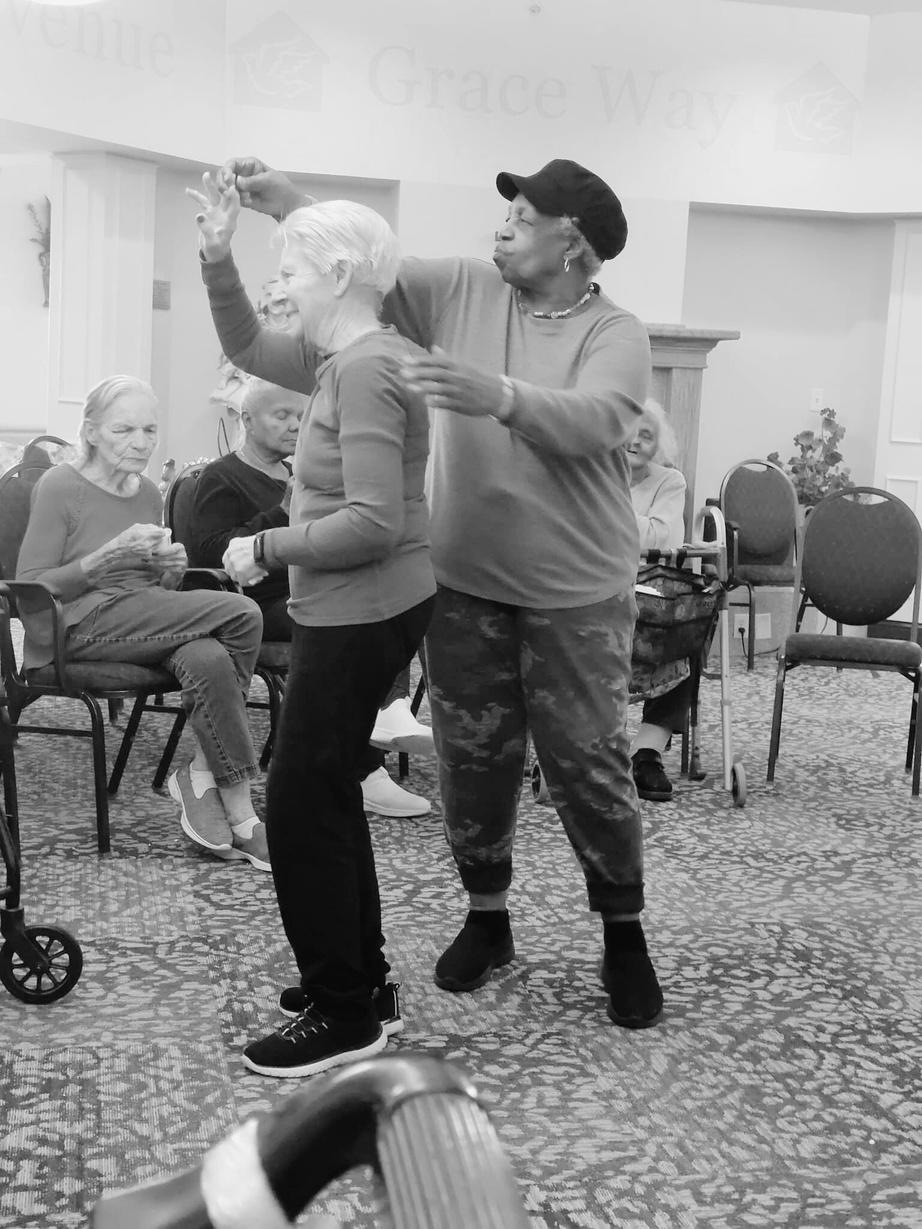
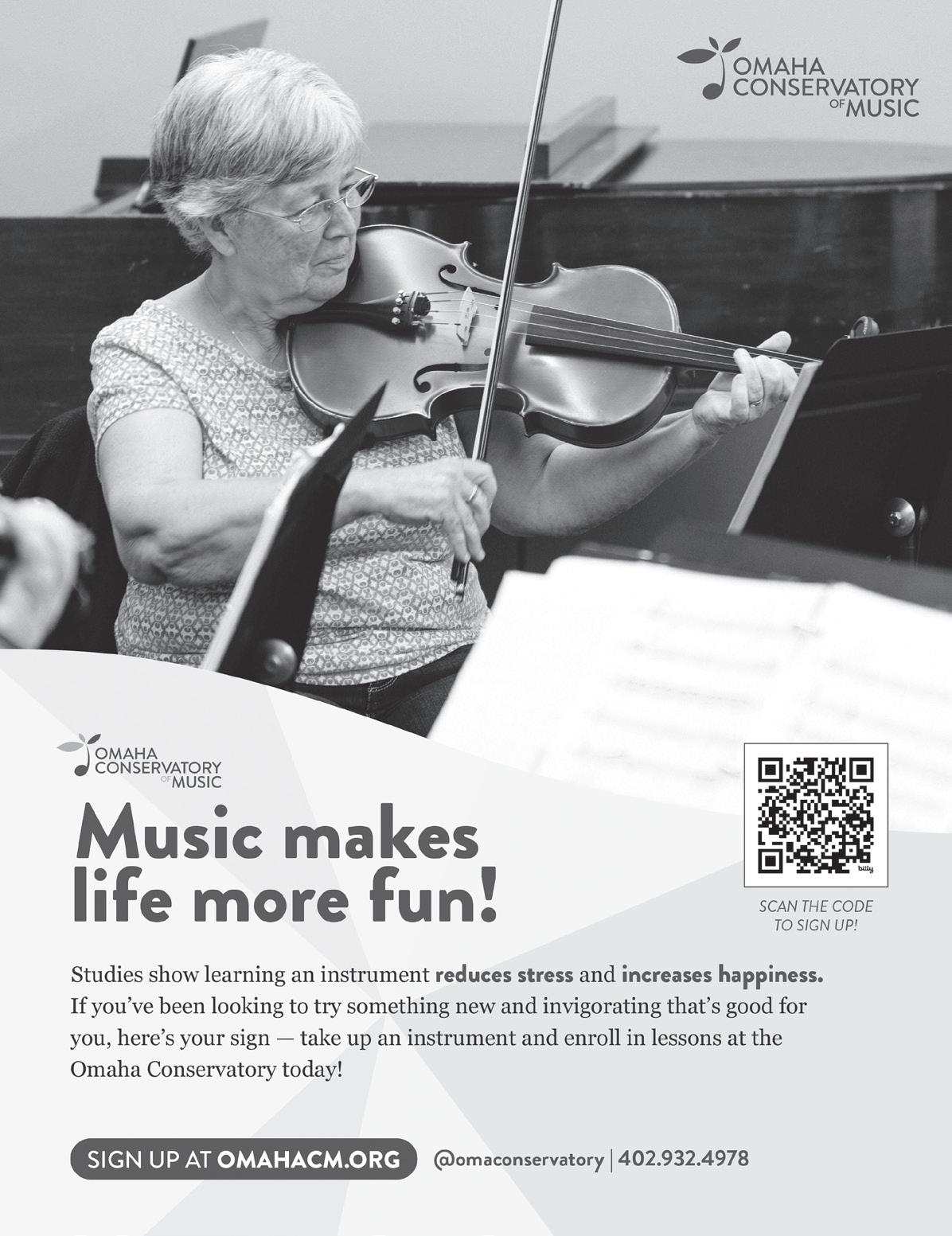
A national survey of women ages 25 and older, commissioned by the National Council on Aging (NCOA) and Women’s Institute for a Secure Retirement (WISER), finds that American women continue to face significant economic stress, and they are concerned about how to pay for health care and other daily expenses in retirement.
Across demographic and party lines, women express strong bipartisan support for federal policy solutions that
For the second year in a row, What Women Say™: Insights and Policy Solutions for Lifelong Security asked women about their financial situation today and how they feel about their future. This year’s survey also included a new set of questions about women’s health. The online poll—conducted by the bipartisan team of Public Opinion Strategies and Lake Research Partners—also explored women’s support for 12 potential policy solutions.
“Health and financial security are the bedrocks of a good quality of life— regardless of age,” said Ramsey Alwin, NCOA President and CEO.
“The survey points to ways we can change women’s retirement pros-

pects,” said Cindy Hounsell, President of WISER. “We can remove the barriers and improve the safety net that so many low- and moderateincome women depend on. We can increase access to retirement plans and provide outreach and information to help women improve their financial decision-making. Clearly, we must begin to make the future more secure for women of all ages and incomes.”
Key Health Findings:
Women are candid about their fears and concerns when it comes to their health.
• From a list of words, women select “uncertain” and “worried” the most when asked how prepared they are for health costs later in life.
• Women rate their general health worse than their mental health, and lowincome and rural women rate their general and mental health a net negative.
• In the past year, roughly 1 in 3 women report having experienced delays in access to health care or food insecurity issues, and 1 in 5 report delays in filling prescription medicines.
• Women view having a low-income as the most negative influence on a person’s health. Having a low education is also viewed as a net negative.
For the second year in a row, American women report substantial economic stress.
• Less than half (49%) of women and only one-third of rural women report having saved for retirement.
• Majorities report they are not financially secure, including 79% of lowincome women and 67% of rural women.
• Low-income White and Hispanic women report their financial security to be worse compared to last year.
• More than 7 in 10 lowincome women say they are not confident about their ability to plan and save for retirement.
• Roughly one-third of all women and half (49%) of low-income women say their retirement income or savings will not be enough to pay their monthly bills— an increase from 2023.
“Nearly 6 in 10 (59%) women and 81% of lowincome women told us they do not make enough money right now to save for retirement,” said Bill McInturff, Partner at Public Opinion Strategies. “Food insecurity also is a reality for about half of low-income Hispanic and White women. These facts directly impact a woman’s ability to plan and save for retirement.”
The survey asked women to express their level of support for 12 potential policy solutions, understanding that these new solutions would likely have a cost associated with them and may require new federal government spending or reductions in spending on other federal programs in order to pay for them. Across party and demographic lines, vast majorities of women supported the solutions. They include: Medicare proposals:
• Expand Medicare coverage, so beneficiaries have access to the full range of care and treatments for serious chronic diseases. (69% strongly support, 95% total support)
• Improve Medicare and Medicaid to better ensure that older adults have the option to receive care at home rather than having to go into a nursing home. (68% strongly support, 94% total support)
Non-Medicare proposals:
• Provide a tax break to family caregivers to help cover the out-of-pocket costs of providing care to a seriously ill, disabled, or elderly loved one. (66% strongly support, 96% total support)
• Modernize and update the federal Supplemental Security Income program that pays monthly benefits to people with limited income and resources who are disabled, blind, or age 65 or older. (66% strongly support, 94% total support) Provide government assistance to lower income older adults to help pay for basic needs, such as food, housing, and transportation. (64% strongly support, 93% total support)
(Information provided by the National Council on Aging).
I did not get a chance to interview Jimmy Carter before the end of his one hundred years of life. But I have recently visited a friend who is 99½. I wondered what these two elders might have in common. What keeps them ticking well beyond the lifespan most of us will attain? When I asked my friend Lucy this question, she had many “pearls” to share.
I suspect the responses from Jimmy Carter would not have been all that different.
Lucy’s first point was that she has always been interested in the bigger world beyond her own needs and wants. All her life she has wanted to learn, keeping her life interesting. Through the years, these wide and varied interests have slowed down some but never turned off. She no longer has the energy to read as much or watch as much TV, but she still stays current with important news.
Another theme of Lucy’s life is her enjoyment of other people. She loves visits from friends (like me) and ZOOMS with her family every Sunday evening. (No doubt part of her learning was how to ZOOM on her computer.) Living in a congregate setting with other elders, she enjoys the conversations at meals
By Nancy Hemesath
but is not trying to develop new friendships. Her circle has shrunk but she cherishes these people, and they are vital to her maintenance of happiness.
While her social connections are important to her, she is also content to be quiet and alone for much of her days. It is her time to reflect on her life lessons and to be in touch with her inner life.
This reflection time is precious to her. She does not fear death because she believes death will be a continuation of her spirit into another realm of reality. Neither does she want to die soon. Because she can eat, sleep, socialize and be comfortable, she is happy to just be.
Lucy’s own life review has helped her understand the need to let go when the time is right as difficult as that might be. She had to let go of her beloved husband, a tough transition that took time. Then eventually she let go of her nursing career, turning it over to younger people. She was active in church volunteer projects, study groups, and other activities.
continued from page 1.
The Hillcrest Foundation for Enhancing Lives is a nonprofit organization that was founded in 2020 by Jolene Roberts and Lisa Summers.
Their mission is to provide gifts and meaningful experiences to older adults in need. While their vision is that older adults are supported at crucial moments in their life journey.
“We will serve any adult in any community,” Lemke said. “Any older adult in need.”

A few items the Hillcrest Foundation for Enhancing Lives have provided includes blankets and bedding for a senior facility, a lift chair for a bed-bound hospice patient and they even installed a wheelchair ramp at a home of an older adult.
“We provide relatively inexpensive gifts, along with experiences,” Lemke said.
To be eligible for a gift or experience, you must be nominated by a caregiver, social worker or someone else in the community.
“We are looking for more nominations
She believes in the value of stepping aside and letting the next generation take up leadership roles at the right time. More recently, she painfully let go of her apartment and moved into assisted living. This, too, she did with grace and continues to live her life with her characteristic contentment.
There are studies that demonstrate that those who live with purpose and positive social connections have better health and greater longevity than those who lack either of these. Based on this information, I asked Lucy if she could think of a crotchety, unhappy person who has lived to be 100. Neither of us could think of anyone. This is hardly a scientific sampling, but Jimmy Carter and Lucy illustrate what a good, long life looks like. They are worth emulating.
(Hemesath is the owner of Encore Coaching. She is dedicated to supporting people in their Third Chapter of Life and is available for presentations. Contact her at nanhemesath@ gmail.com.)
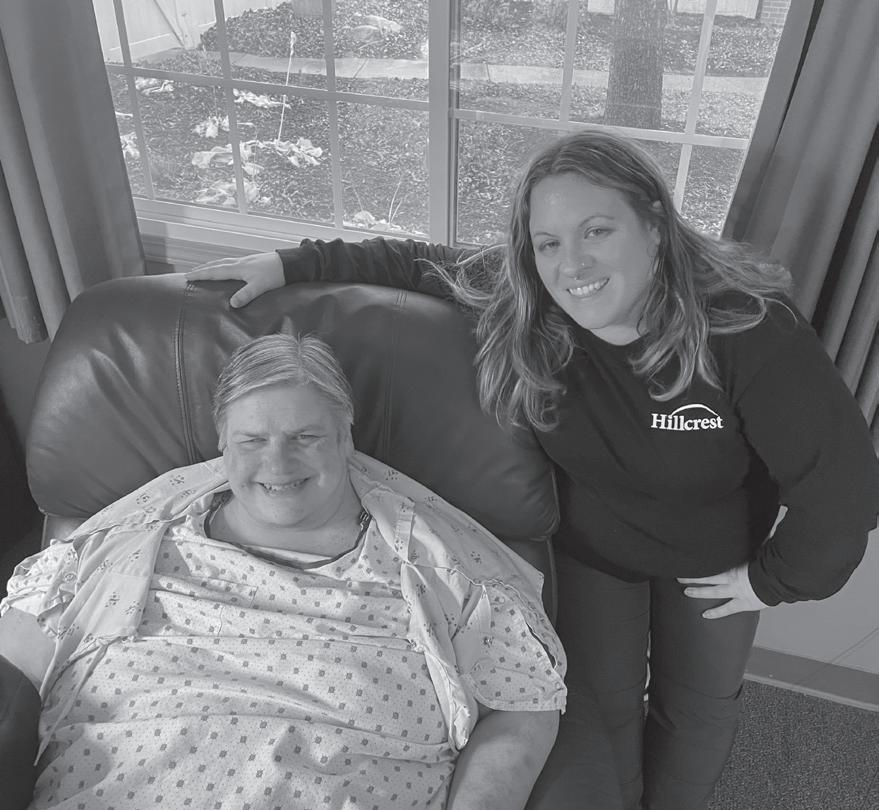
COURTESY PHOTO
Following Theresa’s (left) short-term skilled nursing stay, Sandra Martin, Social Services Specialist with Hillcrest Health & Rehab, coordinated Theresa’s move from her apartment into long-term care.
from people around the community,” Lemke said.
One way to support Hillcrest Foundation for Enhancing Lives is by raising money at their annual golf classic held at Eagle Hills Golf Course in Papillion on August 21.
To learn more about the Hillcrest Foundation for Enhancing Lives, visit their website at hillcrestfoundation.org.
By Andy Bradley Contributing Writer
As kids we loved collecting as many cheap, production-made valentines as we could – a competition of sorts. Our specially crafted red-wrapped collection boxes would brim over with silly valentines from everyone in our class (our teachers made sure of that).
Later, as teens and young adults, having a date on Valentine’s Day became a really big deal. Even a status symbol, especially memorable if you and your partner dined at a fancy steakhouse or cut a rug at a local nightclub.
While Valentine’s Day stereotypically celebrates romantic love, our couples featured here know that real lasting love requires much more than an occasional night out or a Hallmark greeting card. Three couples who have celebrated the pinnacle of a golden anniversary (or longer) share not only their formula for lasting success, but their struggles and near misses as well.
AND THEY SAID IT WOULDN’T LAST
Richard Smolinski doesn’t remember much about the day. May 30, 1970. Other than he attempted to place the wedding ring on the wrong hand of his 17-year-old bride, Karen Wingerson.
They had dated 18 months after each had split with a previous partner. When they first met, “He was dating a friend of mine, and I was dating a friend of his,” Karen recalls. She was 16. Rich was 20.
When announcing their engagement, folks in their orbit of friends and relatives didn’t expect the marriage to last. They thought Karen was too young. Some gossiped that she was pregnant. “They were aghast.” Her parish priest at first refused

to officiate. But it finally came together – Catholic church wedding and all –the day after she graduated from Central.
Karen remembers the day as one of great joy, not unlike the Ray Stevens’ song “Everything is Beautiful,” which topped the charts as the number one hit two days later. “It was surreal. I was just in such a good mood.”
But if she had it her way, the day would have ended with that kiss on the altar –no party and band necessary. “I wasn’t going to have a reception because I said that big weddings were a waste and people shouldn’t have them.”
But her mother and grandmother insisted. So they reserved a diminutive party room at the former Trentino’s, 10th and Pacific Streets. “I remember my mom bought the cake. She said that was her contribution.” Rich’s dad didn’t attend.
A fancy honeymoon wasn’t in the works either. They spent a week with Rich’s brother in Cedar Rapids, Iowa. They carried $45 between the two of them.
The newlyweds settled in a cozy apartment in South Omaha. “And we were perfectly happy,” said Karen. “Nobody was telling us we have to get good furniture, we have to get a house right away and we have to have a good car. We had a Volkswagen bug that had dents all over it.” Rent was $100 a month.
Nevertheless, the couple flourished. Karen was able to capitalize on her interest and skill in computers and landed a job at Mutual of Omaha. “I was going to program computers, and I loved it.” Rich worked at Vickers, where he remained for 35 years before it shuttered its doors in1999, when Rich turned 52. When children came
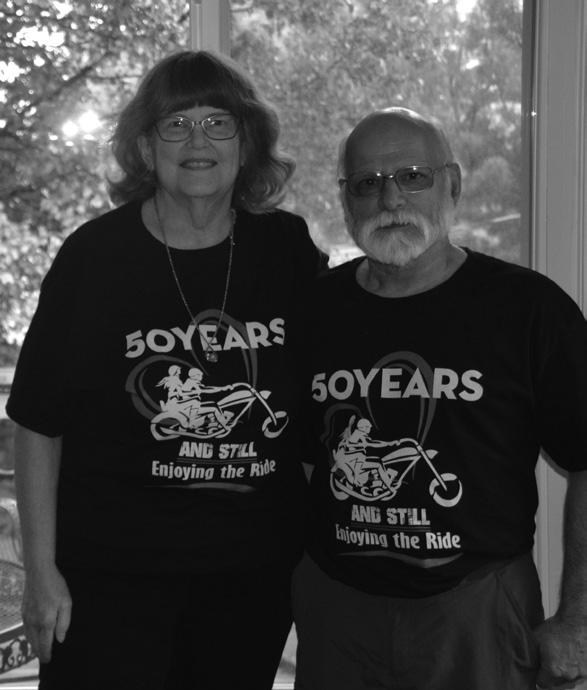
along, two in total, Karen opted to stay home until they were school age.
Upon their seventh anniversary, she opened an unexpected letter from her grandmother. “She sent me a little note that said, ‘I’m sorry. I misjudged him.”
The years passed in a flash, as they always do. With the kids in school, Karen returned to work, employed by several Catholic schools over the years, managing their technology programs, often writing grants to bolster their computer lab resources.
They saved enough to take memorable vacations –Karen even enjoyed riding with Rich on his Harley a handful of times to the Sturgis rally in South Dakota. She considered a road trip to Niagara Falls her real honeymoon – 35 years after the first.
“Now my daughter, my baby, is going to be 50 in March,” Karen said. “And my son turned 50 two years ago.” Their five grandchildren span in age from 17 to 24.
With a half-century of real learned and lived experience, Karen and Rich openly shared their formula for marital success.
Rick suggested, “I guess you just kind of adjust to one another.”
And the ultimate secret in her mind: “He told me once if I ever tell you not to do anything that you feel you really need to do, and it’s important for you, you go ahead and do it anyway.”
This happened “occasionally on small stuff, but on the big stuff we really compromised,” Karen said, adding “Sometimes marriage is 80-20 his way, and sometimes its 80-20 my way. That’s just how life goes.”
In some respects, she feel their humble beginnings ultimately made their life together less pressure-
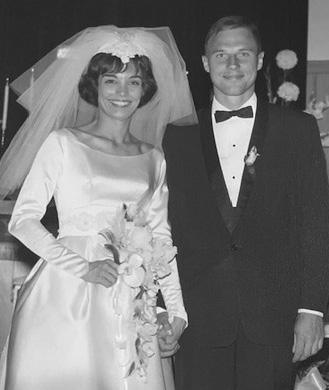
packed. She believes young married couples today place too many unreasonable expectations on themselves to accumulate material goods early on.
“It seems to me like they feel that they have to have a house. They get the house before they get married. They have to have good cars. There’s so much pressure on them to have all of those things.”
Her wedding experience “was just so much calmer. I think that people now when they get married, everything is big, huge weddings, big, huge honeymoons.”
This Valentine’s Day will be low key. Karen continues to battle the effects of cancer and its treatment –an experience the wedding vows don’t quite prepare you for. “When you take those vows ‘in sickness and in health,’ and think of the flu and colds when you’re 17. You don’t realize its new backs (reference to Rich’s back surgery) and cancer and all of that.”
So the 14th will be celebrated simply – maybe an enhanced home-cooked meal, or Rich’s homesmoked meats, if the weather permits. As is tradition, Rich will shower Karen with roses. Six for her. Six for his mother, who lives with them. The suggestion was made. “Maybe eight for Karen, four for your mom.”
HE LISTENED TO HIS MOTHER –EVENTUALLY
Jim and Jean loved to dance. Loved live music. Frequented establishments that featured both. On one of their first dates, in the early 1960s, the couple hit the dance floor at an Omaha club after enjoying dinner at the former Fireside Inn on Leavenworth Street. That was the night Jean knew Jim was for her.
The young man was somewhat quiet, retiring and reserved. Jean wasn’t all that thrilled when Jim asked her out the first time. They had met several times previous. They actually
attended the same elementary school (Washington) and High School (Central), but Jim was four years her senior and their paths didn’t connect.
They were more-or-less formally introduced while skiing at Mt. Crescent north of Council Bluffs. “But he would just kind of sit back and never say anything. So when he asked me out the first time, I thought, ‘well, he’s a nice guy, but this is going to be really boring.’”
Jean had graduated from Midland College in Fremont (now Midland University) and pursued a career as a legal secretary. Jim graduated from the ROTC program at Grinnell College in Iowa, received an officer’s commission in the U.S. Air Force, and served six years, where he learned and practiced the art of aerial refueling of B52 bombers.
Back home, he embarked upon a career in the insurance business and enjoyed his life as a diehard bachelor, consuming his free time with golf and other sports. “Jim was a confirmed bachelor,” Jean admitted. “We dated for two years, and pretty much all of that I still dated other people. I wasn’t going to put myself out on a limb and have the limb cut off.”
But back to that initial official rendezvous. “We had that first date, and we just talked and talked and WOW, I really had a good time.”
Jim recalled that when dropping Jean off at her front door that night, she exclaimed, “I’m really surprised I had a good time!” So many good times followed. “From the first date, whatever I did, I enjoyed it more if I did it with him.”
Like dancing. The nightclub was busy and alive that evening, but when Jim and Jean arrived, no one had yet ventured onto the dance floor. “We got there, and I wanted to dance,” recalled Jim. “There were some new dances out.” The Twist for one. “Anyway, we get out
--Love continued on page 13.
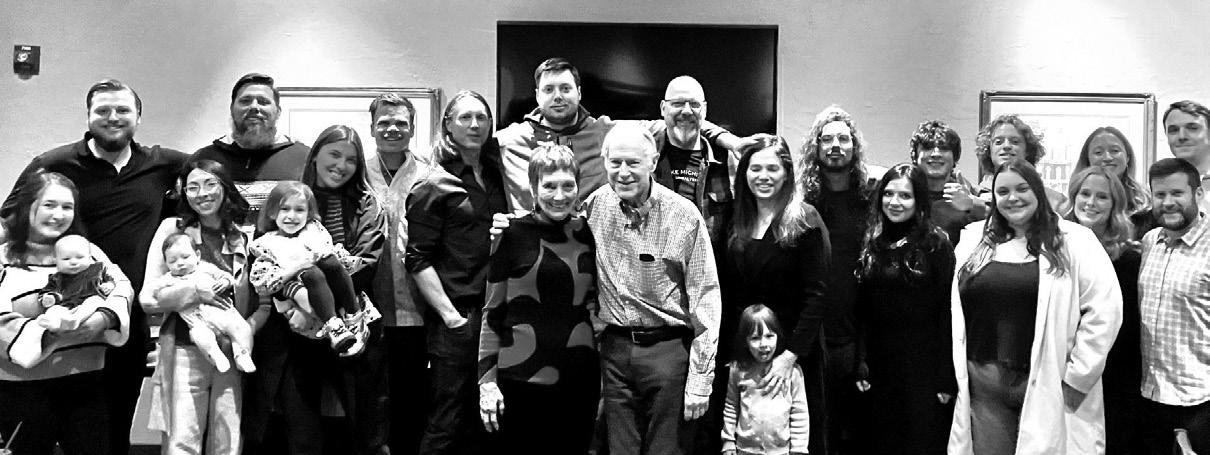
there and we sit down and there’s nobody on the dance floor at all. I said, ‘Well Jean, do you want to get out there and dance?’ ”
“I thought ‘YES’! Because I don’t like timid men that can’t do their own thing. So I thought he’s willing to get out there and dance – YES!”
After they ventured out, “then everybody started to come out and dance,” Jim said, and Jean knew she had her man.
Jim eventually worked up the nerve to introduce Jean to his parents. When Jean went home, Jim’s mother called him over, beaming, and exclaimed, “Jim, she is really a nice girl. MARRY HER!.”
Jim said his mother “was so afraid I was going to be a bachelor forever. “Jim heeded her admonition – albeit a year and a half later.
The couple did exchange vows. Sept. 23, 1964. Sixty-plus years ago now. But the courtship was not without its travails. “I think God really put us together because we did everything we could think of to make it not work.”
“It was God’s will that we married,” Jean said.
The wedding and reception were held at St. Matthew’s Lutheran Church at 60th and Walnut Streets. A honeymoon to Vegas followed, including a stay at the former Desert Inn.
Jim’s career flourished at Aetna Insurance, ultimately becoming district manager for Nebraska and Iowa. When children arrived, Jean managed the household. Three kids in all. Today their adult children live in Oklahoma City, Colorado Springs and Omaha. Eleven grandkids came along, now aged 21-30. Jean and Jim have spent their entire married lives in Omaha.
Keys to their longevity? The couple points to at least four. Mutual interests. Respect. Selflessness. And enjoying one another’s company.
“One of the primary things is respect,” said Jean.
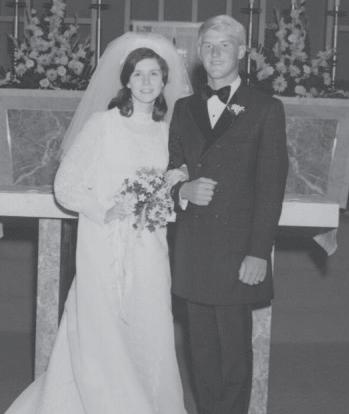
“And then wanting to put the other person before yourself.”
Additionally, she reflected, “I think it’s just so important to enjoy each other’s company. I could do the very same thing with somebody else and just have a better time when I did it with him.”
The number one hit on AM radio the day the Jean and Jim were married –“I’m into something good” by the Herman’s Hermits. Who knew the transatlantic bubblegum rock band could be so prophetic.
COMBINED, SOFIA AND FRANK DEDICATED NEARLY EIGHT DECADES
Sofia and Frank Kock met while students at Iowa State University. Sofia was a freshman, Frank a senior. They met while completing internships at the Des Moines VA Hospital to help pay for their college educations. “Frank was the public-school kid and I was the Catholic school girl.”
A lengthy five-year courtship ensued, culminating in marriage. “I got engaged my junior year in college,” Sofia recalls, “and we got married the following year . . . I graduated in May and we got married in July.”
They married on a scorching hot July 3rd in 1971. Ninety-three degrees, in an un-airconditioned Church and social hall in Des Moines, recalled Frank. The 200 guests certainly sweltered as they circled the dance floor and triplestepped to exhaustion to “In Heaven There is No Beer,” played by a live polka band. After a short honeymoon trip to Kansas City, where, coincidentally, President Richard Nixon was making a cursory political appearance at their Downtown Holiday Inn Hotel, the couple settled in Omaha – hours from family in northeast Nebraska and Des Moines. Frank accepted a job teaching eighth grade science for District 66 – the Westside School District. Sofia landed a teaching job at the former Paul VI High School.
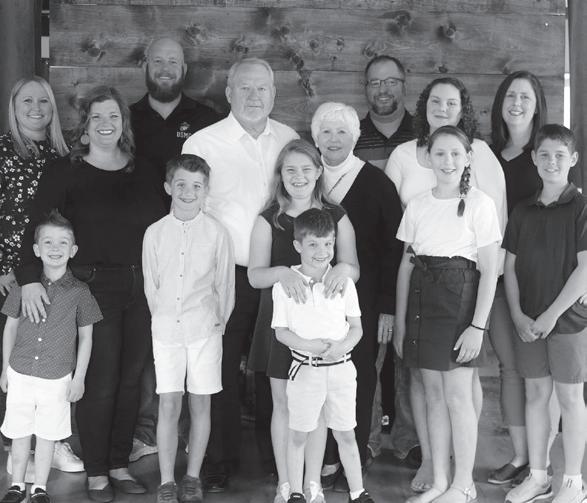
Frank remained with the district for 33 years, until his retirement. Sofia, after staying home a few years, returned to teach at Cathedral, then St. Bernard’s. “Then I had the realization that I could not do junior high science for another 21 years, so I went back and got my master’s in administration.” She served for 19 years as principal of Holy Name Grade School in North Omaha. When retiring, she had served the Catholic Archdiocese of Omaha for 43 years. “So it was a good ride.”
All the while their three children grew up, left home and pursued their own loves and lives. Now, Sofia and Frank are committed to nurturing their seven grandchildren, ages 7-16.
They believe several factors kept them together all these 53 years: swallowing one’s pride, mega doses of patience, and supporting one another’s individual interests.
“You can’t have pride,” cautioned Sofia. “Pride goeth before the fall.” Complemented by “a whole lot of patience.”
Frank added, “We also have our own things that we like to do and we have space to do it . . . You’ve got to have some life of your own.” They each have their own set of friends, as well as friends in common.
Sofia agreed. “Truly we are different in the things we choose to do with our spare time.” Although both of them commit to the charitable work of St. Vincent DePaul at Holy Name Church, their roles are different and distinct. Frank manages the food pantry while Sofia meets individually with persons seeking assistance.
Sofia believes the evolution and impact of technology marks the greatest difference between young couples and families today and her generation. “Even the little guys, they’re dependent on it,” said Sofia.
“And I’ll admit, it is a babysitter . . .they’re not scared of it at all. I’m still afraid to push the wrong button.”
“What did we do without cell phones to be reached every hour of every day, an immediate call or an immediate text you can respond to. We didn’t have any of that and depended on the landline.”
Frank added, “When we
were first married, we didn’t even have an answering machine.”
When Sofia and Frank settled in Omaha, “We were on our own. We didn’t have relatives here or anyone to depend on or go to.” Fast forward 50 plus years. “Today our kids have us,” Sofia said. “And they do rely on us. And we’re happy to be a part of that.”




By Kelly C. Bourne
Phishing attacks are a form of social engineering that try to convince recipients that the sender is a legitimate source like a bank, IRS, vendor, boss or a friend. These attacks can be in the form of an email, text message, phone call or website. The intent is to coerce the potential victim into revealing personal information or surreptitiously install a virus or other form of malware on the victim’s computer or smart phone.
New phishing ploys are constantly being dreamed up, but some of the more common ones are:
• Your Amazon, Facebook or checking account will be locked unless you log in and update your details
• A bill or invoice needs to be paid immediately.
• You’re eligible for a refund or government freebie
• You’ve won a lottery or other substantial prize
• There has been suspicious activity on your online account
• Unbeatable prices for consumer items
• Lucrative investment opportunities with zero risk Victims who fall for the pitch are told to open an email attachment or click on a link in the text or email. The consequences of doing this can be disastrous. Opening the attachment will likely result in malware being installed on the computer or smart phone. The end
results can include ransomware, personal information being stolen or your online activities being monitored. Clicking embedded links also has negative consequences. The website that is displayed may appear legitimate but will actually capture the victim’s login credentials. If the victim logs in, their account may be taken over. Anything of value associated with the account, e.g. money or frequent flier points, may be stolen
Phishing is such a lucrative endeavor for cybercriminals that variations have evolved.
• Phishing – the original version sends generic emails to tens or hundreds of thousands of potential victims.
• Spear-phishing –bad guys investigate potential victims so personalized emails can be sent.
• Whale phishing – attacks directed toward wealthy individuals or executives that potentially have more to steal than the average person.
• Smishing – phishing that arrive in the form of text messages.
• Vishing – phishing that is delivered via a phone call or voice message.
Phishing can occur at any time, and anyone can be a potential victim. Some of the potential clues that you’re a possible victim are:
• Generic greeting like “Dear Customer.”
• A sense of urgency ex-
ists. If you don’t act immediately then your account will be locked or a tremendous opportunity will be lost.
• Early phishing attempts included bad grammar or spelling errors, but that’s not always true anymore. Experience and AI are helping attackers improve their messages to the point that they no longer stand out.
Ways to avoid being the victim of a phishing attack include:
• Be skeptical of caller ID and email return addresses because they’re easy to spoof, i.e., fake.
• Never click a link in an email! If you get an email that says it’s from your bank or another trusted entity, open your browser and enter the URL that you know to be accurate. Even better, use an address saved in your browser’s Favorites list.
• Any email that makes you feel anxious or pressured to act immediately is very likely a phishing email. Delete it.
• No legitimate business or government organization will ever request to be paid with gift cards, cybercurrency or other unusual payment methods. If an email or website requests to be paid this way, it’s a scam.
• If you get a call from someone claiming to be from your bank, tax advisor, cell phone vendor or credit card provider tell them you’re going to hang up and call them back. Call the

phone number on the back of the credit card or on the organization’s website and ask for the person you were talking to.
• Your bank, financial advisor and credit card provider already know your account number. If a caller or an email asks for it or wants you to confirm any personal information, it’s almost certainly a scam.
• The IRS never sends emails telling taxpayers that they owe taxes. That type of communication would always be in a letter sent through the USPS. If you get a phone call, text or email like this then it’s a scam.
• Never provide a caller with additional information. For example, if a caller says your child or grandchild is in jail and needs bail money don’t blurt out their name! Doing that provides the scammer with additional information which they’ll use to make the scam seem even more realistic. Some families agree on a predetermined code word to authenticate their identity.
• If you get an email from a friend or co-worker asking for money or the email just seems to be “off” then it’s possible that their account has been taken over. Before taking any action contact your friend or coworker by phone or text to verify that he or she sent the questionable email.
• If a deal or offer seems too good to be true, then you’re most likely being scammed. Hang up or delete the email.
Some ways to prevent phishing attacks are
• Activate anti-phishing security features if your email provider offers them. They can delete suspicious emails or tag them as questionable.
• Update all of your software regularly. Updates to operating systems, browsers and smartphones frequently address security issues. Having the latest software keeps you and your devices safer.
• Install antivirus software on your computer and smart phone. It can prevent viruses and other forms of malware from being installed.
• Activate a pop-up ad blocker in your browser. This prevents you from seeing and possibly falling for phishing attacks delivered via pop-up ads in your browser.
• Verify that a firewall is installed on your computer or network. Most laptop and desktop operating systems include a firewall. Make sure it’s enabled.
• Decline calls from unknown numbers. If the call is from a legitimate person or business, they’ll leave a message that you can listen to later.
Phishing attacks are a constant in the modern world, but with some knowledge and practice it’s possible to avoid becoming a victim.
Kelly’s newest book, Ransomware, Viruses, Social Engineering and Other Threats: Protecting Your Digital Assets will be available from Mercury Learning and Information in April, 2025.
Legal Aid of Nebraska operates a free telephone access line for Nebraskans ages 60 and older.
Information is offered to help the state’s older men and women with questions on topics like bankruptcy, homestead exemptions, powers of attorney, Medicare, Medicaid, and Section 8 housing.
The number for the Elder Access Line is 402-827-5656 in Omaha and 1-800-527-7249 statewide.
This service is available to Nebraskans ages 60 and older regardless of income, race, or ethnicity.
The Legal Aid of Nebraska hours of operation are 9 a.m. to noon and 1 to 3 p.m. Monday through Thursday, and 9 a.m. to noon on Friday.
Join Flaherty Senior Consulting for a series of Solutions Group gatherings that will address the questions and challenges caregivers face.
Solutions Groups provide opportunities for caregivers to learn how to deal with various issues, obtain skills and knowledge, engage in discussions, and interact with others in similar circumstances.
Upcoming meeting dates and locations are:
• Feb. 6, April 3, June 5, Aug. 7, Oct. 2, Dec. 4 The Servite Center of Compassion 72nd St. and Ames Cr.
• Feb. 19, April 16, June 18, Aug. 20, Oct. 15, Dec. 17 St. Timothy Lutheran Church 93rd and Dodge streets
• March 11, May 13, July 8, Sept. 9, Nov. 11 St. Vincent de Paul Church 14330 Eagle Run Dr.
• March 22, May 17, July 26, Sept. 27, Nov. 29 Faith Westwood United Methodist Church 4814 Oaks Ln.
The Solutions Groups are facilitated by Nancy Flaherty, MS, CDP, president of Flaherty Senior Consulting. She has extensive experience working with family caregivers and caregiver groups.
For more information, email Nancy at flahertyconsulting@cox.net or call/text her at 402-312-9324.
You’re invited to visit the Intercultural Senior Center (ISC), 5545 Center St.
The Intercultural Senior Center facility – open weekdays from 8 a.m. to 4:30 p.m. – offers programs and activities Monday to Friday.
The ISC offers a morning snack, and regular or vegetarian lunch.
Come and exercise at the ISC. It’s never too late to learn and have fun. Join their language classes, technology, jewelry and crafts, and field trip options.
If people need assistance with their benefits, the ISC can help them out.
Lunch reservations are due by 9 a.m. A voluntary contribution is suggested for the meal.
Monthly food pantries are available for adults ages 50 and older.
For more information, please call 402-444-6529 or visit the ISC website at interculturalseniorcenter.org.
The Omaha Fire Department’s Public Education and Affairs Department will install free smoke and/or carbon monoxide detectors inside the residences of area homeowners.
To have a free smoke and/or carbon monoxide detector installed inside your home, please call 402-444-3560.
By Paula Crozier
February isn’t just about chilly mornings and Valentine’s hearts—it’s also Senior Independence Month, a celebration of older adults living life on their terms with purpose, health, and joy. This month is a call to action for seniors to explore creative ways to maintain independence, foster optimism, and stay connected in vibrant, meaningful ways.
Aging is an art, and science agrees. Studies from the National Institute on Aging reveal that regular physical activity can boost cognitive health and reduce the risk of chronic disease. But who says staying active has to be boring? Try virtual reality fitness programs that let you “bike” through the French countryside or dance classes streamed online. Meta has the Oculus, a virtual reality headset that for under $15 a month, has virtual landscapes and easy to use exercise and dance routines that boost health and “get you outside” to mountains, beaches...even other planets. Health isn’t just physical— mindfulness apps and online brain games like Lumosity keep the mind sharp while offering fun and engaging challenges.
Retirement doesn’t mean stepping back; it can mean stepping up. Think of trailblazers like Colonel Harland Sanders, who founded KFC at 65, or seniors leveraging e-commerce platforms to launch passion projects. The Small Business Administration even offers resources tailored for older entrepreneurs. And for those with years of expertise, consider mentoring startups or serving

on nonprofit and corporate boards to lend your voice to the next generation of innovators. The Nonprofit Association of the Midlands and ShareOmaha have valuable resources to get you in touch with nonprofits needing your expertise.
Social connections are essential for well-being, as studies show loneliness can increase health risks equivalent to smoking 15 cigarettes a day. Want to stay inside where it’s warm? Then join online communities like competing in online chess tournaments, joining a global book club, or participating in multiplayer gaming (yes, seniors are dominating platforms like World of Warcraft). Technology keeps relationships dynamic and exciting.
Older adults often have rich life stories and experiences to share, and Senior Independence Month is the perfect time to start writing that memoir, launching a blog, or contributing op-eds to local publications.
Writing not only keeps the brain active but also creates a legacy of wisdom for others.
This February, redefine what it means to age independently. Independence isn’t just about living alone; it’s about living boldly, with health, optimism, and a sense of adventure.
Paula is the Director of Marketing and Development at Florence Home Healthcare Center, Royale Oaks Assisted Living and House of Hope Assisted Living and Memory Care.




The Eastern Nebraska Office on Aging (ENOA) would like to express our heartfelt thanks to the generous donors, including businesses, churches, individuals, and families, who made the holidays brighter for over 600 clients. With the support of these donors, over 1,000 gifts were provided, including items from clients’ wish lists, gift cards, toiletries, paper products, canned food, clothing, cleaning supplies, and more. Every single item is carefully distributed to clients receiving services through ENOA. A special thank you goes to the SeniorHelp program volunteers and ENOA staff members who work diligently to ensure that every gift is delivered by Christmas. We are deeply grateful for the incredible generosity shown by our donors year after year. Your support truly makes a difference in the lives of those we serve.
Amber Owens
Anne Greisch
Barb Parolek
Beta Sigma Phi Sorority- Xi Gamma
Epsilon: In Memoriam of Marge Gowan
Bill Startzer
BLUEBARN Theatre
Bob & Patti Hautzinger
Bob & Mary Hoffman
Bob & Mary Lykke
Bob Sanders
Bonnie Kratina
Brad Birkholtz
Chris Bixler
Chris Gillette
Cindy Kirstine
Cindy Shimerda
CORE bank, Michelle Greenwood
Covenant Presbyterian Church, Robin & John Johnson
Danielle Bliven
Diane & Tom Stanton
Drew & Bethany Clark
Dwight Cole
Doug Bosse State Farm
Doug Halbur
ECO Supportive Living, Neri Hans F. Jordan
ENHSA HR staff
Erin Quinn
Heidi Fostvedt
Jana Halloran
Jeanne & Jim Dale
Jeff & Trish Bergman
Jeri Petersen
Jill Lary
Jim Jennings & Pat Zalesky

John Otto
Jordan Masten
Joy Kamau
Julie Sorensen
Karen
Kate
Kimberlee
Linda
Lorey
Nancy Cooke
Notre Dame Alumni Club of Omaha, Dan McGill
Page Moore
Pam Lewis Pat Gromak
Peace Presbyterian Church, Susan Scholl
Phoebe Headley
Preceptor Alpha Sigma, Dawn Chaples
Rhonda Mays
Right at Home, Jenny Andreoli
Ryan & Marla Headley
Sandy Luedtke
Sarpy County Courthouse, Jenni Rock
St. Gerald Catholic Church, Diane Stanton
St. John Vianney Church, Deacon Chris Hanson
St. Patrick Catholic Church (Fremont) Mary Narans
Steve & Chelsea Kuhn
Sue & Archer Witherell
Susan Scholl
Teresa & Todd Clark
Tillie Portus
Tom Vinton
Trisha Funk
United Republic Bank, Amy Pelz, Anne Riley
UNMC Engage Wellness, Lesley Wadhams & staff
UNMC Geriatrics, Travis Weyant & staff
UNO Dept. of Gerontology, Kara Negley
Vickie Roche If you would like to donate for the holidays in 2025, please contact Danielle Bliven at 402-561-2219.